
a treasure-trove of literature
treasure found hidden with no evidence of ownership
(and our other authors) or get HELP Reading, Downloading and Converting files)
or
SEARCH the entire site with Google Site Search
 |
Project Gutenberg
Australia a treasure-trove of literature treasure found hidden with no evidence of ownership |
BROWSE the site for other works by this author (and our other authors) or get HELP Reading, Downloading and Converting files) or SEARCH the entire site with Google Site Search |
Title: Landlopers Author: John Le Gay Brereton * A Project Gutenberg Australia eBook * eBook No.: 1300671h.html Language: English Date first posted: January 2013 Date most recently updated: January 2013 Produced by Colin Choat Project Gutenberg Australia eBooks are created from printed editions which are in the public domain in Australia, unless a copyright notice is included. We do NOT keep any eBooks in compliance with a particular paper edition. Copyright laws are changing all over the world. Be sure to check the copyright laws for your country before downloading or redistributing this file. This eBook is made available at no cost and with almost no restrictions whatsoever. You may copy it, give it away or re-use it under the terms of the Project Gutenberg Australia Licence which may be viewed online.
GO TO Project Gutenberg Australia HOME PAGE
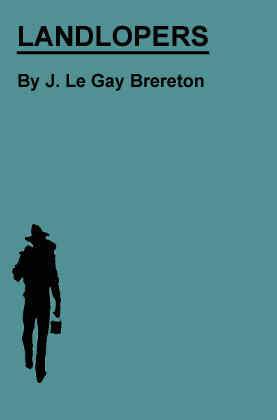

TO MY FRIEND
R. F. IRVINE
(Author of "Bubbles, His Book.")
I cannot offer you cakes and ale,
But camp-fire bread and a billy of tea—
A loafer's dream and a swagman's tale.
I cannot offer you cakes and ale,
But a johnnie-cake and some post-and-rail
I trust you'll share by the track with me.
I cannot offer you cakes and ale,
But—camp-fire bread and a billy of tea!
J. L. G. B.
|
A FOREWORD.—Of Tramps and Tramping DAY I (12 March).—Of a Fever in the Veins of Knight Wilford DAY II (13 March).—Of The Boy DAY III (15 March).—How Arthur Seaton promised to write a Letter DAY IV (15 March—later).—Of Sabbath Observance, and how Marjorie hardened her Heart DAY V (16 March).—How Wilford set out for Home; and how he and The Boy shed the Husks of Custom NOTHING TO DRINK DAY VI (17 March).—Of a Swagman, and the Liberality of Tramps; the right Enjoyment of a Camp-fire FIAT LUX DAY VII (18 March).—How Wilford bore him as a Lunatic; how the Trav'lers were posed as Rouseabouts; and how they slept on the Foothills of the Mountains REST DAY VIII (19 March).—How the Rain veiled the Mountains; of such is the Kingdom of Heaven; how the Trav'lers looked for a Camp, and found shelter in a Cave ERRANT LOVE DAY IX (20 March).—Of the Wild Beasts of King's Cave; and the Three Men at Hazelbrook; with the sad Tale of the "Clurk" THE BOND OF THOUGHT DAY X (21 March).—Of Colonel Turbot and the Mystery of the Damosel; the Glamour of Wentworth; and how Wilford's World was transfigured A RIME OF THE SHORELESS SEA DAY XI (22 March).—Of the Passage of a River; the Hills of Many Slopes; the Dreariment of the Black Range; and the strange Foresight of Fence-builders and Road-makers DAY XII (23 March).—Of the manifold verbiage of The Boy; the quest of a Breakfast; the Camp in the Devil's Coach-house; and how Wilford had fair tidings of Marjorie MY DEAR DAY XIII (24 March).—How The Boy stooped for Silverlings; and how Wilford heard the Voices of the Creek MOONLIGHT DAY XIV (25 March).—Of MacEwan the Outlaw; the Advent of Beauty and Fashion; and the end of the Adventure of the Silver Coins A WORD OF LOVE DAY XV (26 March).—Of the Glass Cave; and the Slab Hut FRIENDS OF MINE DAY XVI (27 March).—How the Trav'lers inspected a Selection-fence; and how they slept on a Straw Bolster DAY XVII (28 March).—Of the Diggers' Settlement; the Example of Cathay; and the Friendliness of Mr. Dawson DAY XVIII (29 March).—How the Burly Bushman sped the Trav'lers; and how the Dogs raised up false hopes. Of the Caves House at Wombeyan, and the Tableau of Bluebeard's Wife DAY XIX (30 March).—How Wilford and The Boy Addressed them to Bring a Wild Pig to the Pinfold OPEN SPEECH DAY XX (31 March).—Of the Vision of Marjorie; the Descent to the Wollondilly; the Gift of Heaven; a Night in a Log-house LIMITATION DAY XXI (1 April).—Of a Man and a Dog DAY XXII (2 April).—How Wilford took a Short Cut, and saw Brown Eyes; of the Mark of Civilised Life; and Rest under the Willows WE TWO ARE WED DAY XXIII (3 April).—How the apparent Evil Plight of Wilford won him the offer of a Pair of Boots; and how he became a House-painter for the sake of Saint Charity NOCTURNE DAY XXIV (4 April).—Of the Hard Hearts of Picnickers; and the Pleasant Sojourning at Barrengarry C'EST MOI DAY XXV (5 April).—Of the Free Dealing of Bread in Kangaroo Valley; and the Camping by the Ford DAY XXVI (6 April).—How a Fire leaped on the Store-pile; of the Coming to the Sea coast, and the Noise of Many Waters; and how The Boy walked in a Quagmire DAY XXVII (7 April).—Of the Mystery of the Sea; the Cricket's Call to Arms; Mr. O'Keefe, the Friend of the Weary; the Boarding of the Railway Train DAY XXVIII (8 April).—Of the Hunting of the Black Snake; and of the Gift of Ham Sandwiches; and how a Storm chased the Trav'lers from their Camp A ROUNDEL OF NATURE'S EAGERNESS DAY XXIX (9 April).—Of Three Drunken Miners and a Draught of Rum DAY XXX (10 April).—Of a Sleepy Day, and the finding of a Bed BENEATH THE TREES DAY XXXI (11 April).—Of Mad Weather, and how the Trav'lers met the Queen of Solitude DAY XXXII (12 April).—How the Baker's Wife fed the Famishing Wanderers; and how they fared in a Kindly Haven SYMPATHY DAY XXXIII (13 April).—Of the Gladness of Human Contact; CITY CHANNELS; and how Wilford came Home, and heard Marjorie singing AN AFTERWORD.—Of this Book |
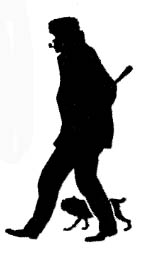 If it be fair to take one's
impressions from English books and papers, I am surely justified in
supposing that the average British "tramp" is a despicable loafer
or an abandoned ruffian. The Australian "trav'ler" is on a
different footing. Ragged prowlers do not hide behind Australian
barns and watch for unprotected females to insult or blue-eyed
babes to kidnap. Our girls can usually look after themselves, and
our infants are saleable only at starvation prices. And yet the
country is full of moneyless men who "pad the hoof" from place to
place, and drift backward and forward, always begging, occasionally
stealing, seldom finding rest, and in some cases quite undesirous
of a more settled fortune or a less precarious mode of existence.
These men belong to the vast army of The Unemployed. When a poor
tradesman or labourer is out of work, he must move on or starve on
the spot. He therefore rolls up his "bluey" and starts off, billy
in hand, "on the wallaby track" in search of a job. But countless
others are engaged in the same quest, and jobs are scarce. Some
wanderers are eventually enthralled by the irresistible charm of
nomadic idleness, and are unable to return to a definite and
cabined way of life.
If it be fair to take one's
impressions from English books and papers, I am surely justified in
supposing that the average British "tramp" is a despicable loafer
or an abandoned ruffian. The Australian "trav'ler" is on a
different footing. Ragged prowlers do not hide behind Australian
barns and watch for unprotected females to insult or blue-eyed
babes to kidnap. Our girls can usually look after themselves, and
our infants are saleable only at starvation prices. And yet the
country is full of moneyless men who "pad the hoof" from place to
place, and drift backward and forward, always begging, occasionally
stealing, seldom finding rest, and in some cases quite undesirous
of a more settled fortune or a less precarious mode of existence.
These men belong to the vast army of The Unemployed. When a poor
tradesman or labourer is out of work, he must move on or starve on
the spot. He therefore rolls up his "bluey" and starts off, billy
in hand, "on the wallaby track" in search of a job. But countless
others are engaged in the same quest, and jobs are scarce. Some
wanderers are eventually enthralled by the irresistible charm of
nomadic idleness, and are unable to return to a definite and
cabined way of life.
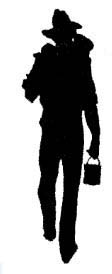 In the beginning of the
shearing season, the main current sets westward, and the wayfarers
wander from shed to shed on the inland stations. When shearing-time
is over, the tide sets back towards the cities. Travelling in the
"out back" country is full of hardship—"and there is no health in
it," as a vagabond rouseabout once told me. In the dry season,
hardly a drop of water is to be had: in the wet season, the whole
country is a puddle of mud of various consistency. Travelling in
the coastal districts is distinctly pleasant, if the weather be
moderately fine. Personally, I have never tramped on the western
side of the Blue Mountains.
In the beginning of the
shearing season, the main current sets westward, and the wayfarers
wander from shed to shed on the inland stations. When shearing-time
is over, the tide sets back towards the cities. Travelling in the
"out back" country is full of hardship—"and there is no health in
it," as a vagabond rouseabout once told me. In the dry season,
hardly a drop of water is to be had: in the wet season, the whole
country is a puddle of mud of various consistency. Travelling in
the coastal districts is distinctly pleasant, if the weather be
moderately fine. Personally, I have never tramped on the western
side of the Blue Mountains.
The trav'ler usually gets his food by the system which he honours with the title of "bummin'"—in other words, he begs it. He levies his tax upon every homestead, and everywhere he meets with helping hands. Of course, many graceless scamps take advantage of this state of affairs and roam about the country for a living. They are professional trav'lers. They refuse to work, because for them labour is an unnecessary trouble. They camp on the outskirts of a township until they have thoroughly bummed it, and then they set out for pastures new.
When I am out of employment in the summer time, I become a trav'ler. My tactics depend upon the condition of my finances. Sometimes I pay my way; sometimes I am a bummer. Why I love the rough and ready life of comparative hardship, and what comfort I find in the manifold discomfort of "the track," are questions which the reader may answer for himself when he has come to the end of Knight Wilford's narrative.
It must be obvious to the most casual reader—even to the counter-lunch man, who takes his literature in snacks at the bookstalls—that much of the story is founded upon the author's own experiences. Therefore I think well to explain that "The Boy" is not a portrait of any of my friends, though in depicting him I have found it convenient to borrow a few accidental details (of costume, employment and so forth) from one who travelled with me a few years ago. But essentially "The Boy" is himself alone.
J. LE GAY BRERETON
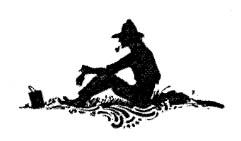
 Still at home: still at
work. From the window where I sit, I can see some of the roofs and
spires of the city, above which hangs the dark morning-cloud of
smoke. By road, it is seven miles to Sydney—seven dreary, dusty
miles. Half a mile to the southward of this house is the village of
Gladesville on the hills above that portion of the Harbour which is
mis-named the Parramatta River. And here I sit, pent in by four
walls and faced by an irregular array of books and manuscripts. The
hideous sameness of things! The misery of clock-work regularity!
This limited existence galls me; and the enforced study of Old
English poetry increases my dissatisfaction. Freedom and action
nerve every line of Anglo-Saxon verse. To start reading the ancient
songs is to plunge into the swirl of foaming sea-waves and to feel
the battle frenzy. If I am to stay here, I must read something
soothing and enervating—conservative and Tennysonian. But only one
thing can bring me peace now. The old longing is upon me—the
longing for the open road and its lazy labour. I want to burst
these prison-walls of home and custom; to meet my mates of former
days on the proper footing, and to mingle with them unrestrained
and unrebuked. My fellow-thanes await me. I hear their voices and I
must go. I must lie close to the living earth, encompassed by the
stars. My eyes are dim with longing for the dear blue of hills and
sea and sky. I am eager for a thousand natural pleasures; to dive
down into cool water and gaze up through spaces of dim green or
grey, or mark in clear depths the blending of tints in wave-worn
pebbles and aquatic weeds; to let the branches of trees sweep
across my face and body, causing indescribable thrills of love; to
lie with my back against a hill and watch slow melting clouds, and
see birds gliding down the wind; to sink my face in sweet-scented
grass, and spread my fingers that I may feel the caress of the
elastic blades; to rejoice in the smooth flow of the breeze; to
stand upon the shore and feel the ceaseless pulsing of the Pacific.
I am hungry for communion with these mates of mine. And then the
freedom from restraint, the fetterless uncertainty of vagrant life!
And the darling children by the wayside!—children who laugh shyly
at the incomprehensible tramp who asks such foolish questions. He
asks them merely for the sake of hearing childish tones and looking
into childish eyes. The confidence of these younglings is not won
until they have done the poor trav'ler a favour—filled his billy
with water, perhaps. It is one of the earliest-developed traits of
our nature that we love better those whom we freely serve than
those from whom we receive service. These things need not be
curiously enquired into. Enough for us that they are good. And the
tramp can appreciate everything, and can find enjoyment even in
misfortune. He is not stifled by conventional obligations. He
wanders at large in a perfect atmosphere of love. He is on the
common level; no social lies raise him to a pedestal or depress him
in a cess-pit. He feels his fellowship with Nature. An individual,
he is yet merged in the universe. He recognises his union with the
Divine. He is a god. And the people whom he passes on the road see
only a tramp with fringed breeches and a hat full of holes. They
wonder at his half-curbed bursts of laughter, and possibly suppose
he may be mad. But he is so brimming with exultant joy that he
would like to clasp the hand of every man he meets, and kiss the
lips of every girl...
Still at home: still at
work. From the window where I sit, I can see some of the roofs and
spires of the city, above which hangs the dark morning-cloud of
smoke. By road, it is seven miles to Sydney—seven dreary, dusty
miles. Half a mile to the southward of this house is the village of
Gladesville on the hills above that portion of the Harbour which is
mis-named the Parramatta River. And here I sit, pent in by four
walls and faced by an irregular array of books and manuscripts. The
hideous sameness of things! The misery of clock-work regularity!
This limited existence galls me; and the enforced study of Old
English poetry increases my dissatisfaction. Freedom and action
nerve every line of Anglo-Saxon verse. To start reading the ancient
songs is to plunge into the swirl of foaming sea-waves and to feel
the battle frenzy. If I am to stay here, I must read something
soothing and enervating—conservative and Tennysonian. But only one
thing can bring me peace now. The old longing is upon me—the
longing for the open road and its lazy labour. I want to burst
these prison-walls of home and custom; to meet my mates of former
days on the proper footing, and to mingle with them unrestrained
and unrebuked. My fellow-thanes await me. I hear their voices and I
must go. I must lie close to the living earth, encompassed by the
stars. My eyes are dim with longing for the dear blue of hills and
sea and sky. I am eager for a thousand natural pleasures; to dive
down into cool water and gaze up through spaces of dim green or
grey, or mark in clear depths the blending of tints in wave-worn
pebbles and aquatic weeds; to let the branches of trees sweep
across my face and body, causing indescribable thrills of love; to
lie with my back against a hill and watch slow melting clouds, and
see birds gliding down the wind; to sink my face in sweet-scented
grass, and spread my fingers that I may feel the caress of the
elastic blades; to rejoice in the smooth flow of the breeze; to
stand upon the shore and feel the ceaseless pulsing of the Pacific.
I am hungry for communion with these mates of mine. And then the
freedom from restraint, the fetterless uncertainty of vagrant life!
And the darling children by the wayside!—children who laugh shyly
at the incomprehensible tramp who asks such foolish questions. He
asks them merely for the sake of hearing childish tones and looking
into childish eyes. The confidence of these younglings is not won
until they have done the poor trav'ler a favour—filled his billy
with water, perhaps. It is one of the earliest-developed traits of
our nature that we love better those whom we freely serve than
those from whom we receive service. These things need not be
curiously enquired into. Enough for us that they are good. And the
tramp can appreciate everything, and can find enjoyment even in
misfortune. He is not stifled by conventional obligations. He
wanders at large in a perfect atmosphere of love. He is on the
common level; no social lies raise him to a pedestal or depress him
in a cess-pit. He feels his fellowship with Nature. An individual,
he is yet merged in the universe. He recognises his union with the
Divine. He is a god. And the people whom he passes on the road see
only a tramp with fringed breeches and a hat full of holes. They
wonder at his half-curbed bursts of laughter, and possibly suppose
he may be mad. But he is so brimming with exultant joy that he
would like to clasp the hand of every man he meets, and kiss the
lips of every girl...
And Marjorie? Is the breach permanent this time; or will she forgive me for the gusty violence of my love? To what end does the Life-Spirit set the blood of a man boiling on the flame of passion? I am a law-abiding subject of a Sovran who crumbles your manufactured rules as Time brings to naught the parchment they are written on. I am called a rebel, because I resist all senseless and unnatural tyranny. And Marjorie? The longest way round, as some Scriptural writer says, is the shortest way home. I shall start for your door, my own, by turning my back on it.
The bell! Gods, how I hate this deadly regularity! Curse their punctual habits! But dinner is dinner.
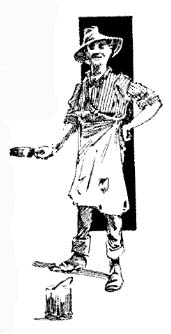
The Boy crossed my track to-day. He is eighteen years of age, but looks several years younger. By trade he is a house-painter. I asked him whether he would swear mateship and shoulder swags with me. He will.
So it is all settled, and we are to start as soon as The Boy has finished his current job. I must borrow some money. Farewell to conventionality and Anglo-Saxon!
Busted be Beowulf, blasted the aetheling.
Blooming well blowed be the bloke under helm!
But whose ear can I bite for a few bob?
Marjorie is still on the snow-clad heights of displeasure. She was at church this morning. I sat in the next pew. She was supernaturally decorous, and concentrated her attention upon the sermon with a Sabbath solemnity unusual in her. For my part, I tried to look like a despairing penitent. With an expression of sorrow and humiliation, I watched the flies dancing a saraband under the chandelier. But she did not once look in my direction. A holiday will do me no harm, but I'll make up lost time when I come home, for she loves me and I know it.
After lunch, I went across to chat with Arthur Seaton. We sat on the edge of the verandah and smoked.
"Seen Marjorie Traill lately?" I said, blowing rings.
"No," he grinned; "but I expect you have."
"No I haven't," I said. "I'm going away for a while, in a day or two—and you know how a fellow's time all gets taken up."
"Where the dickens are you going now?"
"Don't know. But I wish you'd write to me when I'm away."
"But if I don't know—? "
"Write to Jenolan, and if I don't go there I'll have it forwarded. Let me know about the things you think I take an interest in."
"When will you be back?"
"Don't know. But write in about a week."
"Well, by the Lord, Knight," he said with rather disrespectful admiration, "it's no wonder people say you're mad."
Half an hour later I turned at the gate after saying good-bye, and called: "Arthur By the way, if you happen to see Marjorie before you write, you may as well let me know how she's getting on."
And he nodded and winked. The nod was for me, the wink was for himself.
This morning I met The Boy about ten o'clock. He said he had finished the job on Saturday.
"Very well," I said, "we start to-day."
We gathered together our traps and equipped ourselves for the journey, and by eleven o'clock we were on the road. A trav'ler does not carry more weight than he can help. Bill asked whether he should bring a watch.
"To what end?"
"I don't know."
"Then leave it at home."
I am dressed in clothes which are remarkable only for their antiquity. My brown trousers have an important blue patch, and my shaggy hair protrudes through two holes in my soft felt hat. Into my pocket, along with a tooth brush and other trifles, is thrust a "Canterbury Poets" copy of Leaves of Grass. A large cotton kerchief takes the place of collar and necktie. In my swag I carry two extra flannel shirts and a few pairs of socks, with a piece of American oil-cloth measuring about six feet by four. In the "nose-bag" are small "tucker-bags" of tea, sugar, oatmeal, rice, and lentils, and a tin of mixed pepper and salt. The swag is made by rolling your pair of blankets into cylindrical shape with your extra clothes inside. This bundle is strapped at each end, and the end fastenings are connected by a "shoulder-strap," which in my case is represented by a rolled towel. The swag is slung from the right shoulder. The nose-bag containing food is bound to the upper end of the swag, and hangs in front of the body over the left shoulder. The whole load when properly adjusted is perfectly balanced and easy to carry. The Boy's get-up is similar to mine, the main difference being that his blanket is gaudy with red and blue, whereas mine is an uniform sober grey.
"Afoot and light-hearted I take to the open road," I quoted. And Bill, knowing not The Answerer, nodded and said: "So do I."
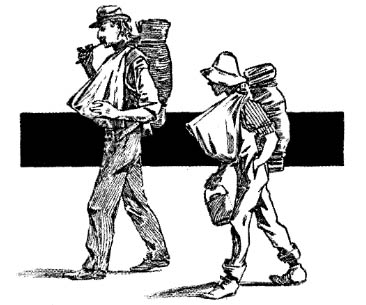
We took the main road, and after having lunch in a ferny hollow near the village of Ermington, trudged in dusty content into Parramatta. For about an hour we strolled about the old town which Bill had never before visited, and examined various objects of interest, including the house where a murder had been committed, a dead dog, and the oak-tree against which the wife of an Australian Governor was once thrown from a buggy. A commemorative obelisk stood near the tree, and just beyond the obelisk was a standpipe. We filled our billies—for I was uncertain of the water-supply beyond—and proceeded through the Park in the general direction pursued by the railway line, which we here sighted for the first time. A mile or two beyond the town we pitched our camp in the scrub. Bill was anxious to make a gunyah, though there was absolutely no need for it, and has actually erected a rude and inadequate shelter of gum-suckers. But his energy will abate when the novelty of sleeping in the bush has worn off. A gunyah, by the way, is a lean-to, constructed of boughs or bark, after architectural designs supplied by the blacks. We lit our fire, spread the oilcloth on the ground, and arranged our blankets.
As we sat before the fire and smoked our pipes, after a simple but by no means scanty meal, I remarked to The Boy:—"Bear this in mind, Bill: we have left our forks and serviettes behind us, and we are not to be overshadowed by them. We are free, for a while."
The Boy smoked and grinned, wondering what serviettes might be.
"We are now in the bush, and partners of the wild things. We merely add hypocrisy to their list of virtues."
"Ryebuck!" said The Boy.
"Morality and immorality," I continued in my most pompously sententious manner, "are the twin children of bondage, and we have left them at home with their mother. We are the masters of all wealth. Whatever is good is ours. If birds are caught in an orchard, taking their fill of fruit, they are shot: if we're caught too obviously enjoying our liberty, we shall be immured. There's no difference."
"You're a regular savage," interposed The Boy placidly.
"No," I replied, "unhappily most irregular. God bless all pagan rebels!"
And with that we silently lay back on our blankets and watched through the branches the star-flecked sky.
I write in the midst of a clear silence, shot through with the alternate chirping of frogs and the click and chink of myriads of nocturnal insects. Dear sea of life, I plunge into your warm waves, electrified with the subtle flow of love. I am happy. I am free.
NOTHING TO DRINK
Nothing to drink but water going bad
In hollows where rank grasses rot and stink
Nothing but this foul puddle to be had
Nothing to drink.
The surface of the stuff is green and pink
With iridescent changes; yet I'm glad
To lie out here upon my back and think
For here no longer custom drives me mad;
And in the town, too, I have had to slink
Dry-throated home, and gasp the story sad—
"Nothing to drink!"
|
|
Soon after daybreak, I took the billies down to the creek. The water there was thick and red with mud from the road, eminently suitable for cocoa, but impossible to disguise with tea. However, I followed the stream up, and found a shallow weedy pool, which was not too greatly discoloured. The Boy said it was filthy, but he is not accustomed to the naturally-collected water of districts more than half civilised. On previous tramps I have drunk raw mud which was like thick black cream, and I have made tea which left hard terraces of manure round the interior of my pannikin. I told The Boy so, and he did not believe me. Before he returns home he will learn to style all translucent water clean.
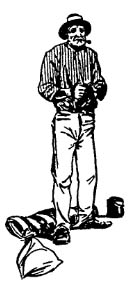
After breakfast we followed the railroad, most of the way through scanty bush, but emerging occasionally upon a road. Near Seven Hills we bought a loaf from a passing baker, and lunched with our feet in the gutter. I was drowsily filling my pipe and watching the intricate dance of a mob of midgets, when a trav'ler swung along the road. He stopped and asked for a match, which I gave him after I had lighted my own pipe with it. Then he dropped his swag, sat on it, puffed awhile, and finally asked:
"From Richmond?"
"No—Parramatta. No regular course."
"Dunno what sorter road this is?"
"No. How is it the way you've come?"
"Goin' to Penrith?"
I blew a ring of smoke and nodded at it.
"Good road," says the tramp, "all the way. You won't run short o' tucker."
"Have a drop o' tea?"
He swigged from the billy, spat out a couple of tea-leaves, and looked at me with meditation in his eye. I yawned a chest-full of smoke at the sky and returned his look, languidly and without interest. He concluded from my appearance that I was sufficiently dishonest to be trustworthy; so he took me into his confidence.
"There's good peaches, a bit back." He jerked his thumb over his shoulder. "I wuz thinkin' at first, there wuz a dog. All right, though. I eat 'em all quick—them I'd got—for fear they'd be found on me."
"Peaches!" The Boy exclaimed, and gulped.
"How far?" I asked; and the good fellow generously gave me full directions. I thanked him, and he heaved his swag to his shoulder, nodded "Good luck!" and went.
It is a remarkable fact that always, when I am on the track, I am the recipient of abundant kindness and hearty hospitality. Most Australians are warm-hearted and open-handed, almost to a fault. Circumstances may obscure their goodness of nature for a time, but in the end the light of their inborn virtue breaks through the clouds, and they live in memory, clad with unselfishness and haloed with loving-kindness. I once camped the night with a shearer, and so far misjudged him that I fell asleep with the idea that he was the stingiest blasphemer on the continent. But in the morning he showed me how to catch stray ducks with a noose of string suspended from a stick.
Dessert is an infrequent luxury to the trav'ler, and we partook of the heaven-sent gift with thankful hearts. We got further supplies of fruit later on, for the orchards abut on the line, and we could not have avoided them without making detours of inconvenient compass.
Our camp to-night is in a coppice of oak saplings, on the flat above a fair-sized creek. I do not know certainly, but I believe the last station we passed was Doonside—a platform with a paddock full of mushrooms beside it. The frogs are chirping and tap-tapping to each other across the creek, and our fire of driftwood is blazing and crackling. The water here is moderately clean, but rather unpleasant in flavour. The Boy insists that there must be a piggery on the bank higher up; but the taste is merely that of rotting foliage. There is a waterhole within a stone's-throw of our bed. In the morning I shall swim.
What a delicious thing the warmth of a fire is! How it soothes the body, and sweeps in soft waves across the skin with every breath of wind! But I protest against stuffy rooms and onion-casings of clothing. Why should our skin be so sensitive to no purpose? Every square inch of body-surface gives foothold to a pleasure. The only way to enjoy a fire thoroughly is to pose before it as a nudity. Perfect pleasure is inconsistent with cerements. Wind, water, sunshine—is it possible for mummy-swathed wretches to realise the ideas represented by these words? If we would understand Nature—sweet naked living Nature; if we would meet her and know her, seeking her not as a blind-worm scientist, but as a lover; if we would be uplifted with the joy of her kisses; then we must strip off these artificial hindrances and become as nude as she. And what is the value of these wrappings, after all? Are they worn as a protection from the cold? But I have noticed that those who lap themselves in the thickest clothing are the first to complain of chilled bones. It is largely a matter of habit. Do clothes add beauty to the human form? Answer, the Art of Greece! But, says a sickly apologist, many of us have bodies which are not joys for ever. And will it improve them, I ask, to smother them in dank and poisonous darkness? Will you attempt to give them beauty by denying them light and air? Ah, but the doctors say—. They have said it was good to swallow doves' dung and powdered unicorn's horn. They say it is beneficial to inject certain excretions of disease. They are always certain. For truth's sake, never heed the doctors. Listen to the voice of Nature, the voice of the Soul, the voice of God. Listen to my voice.
|
FIAT LUX
The light of Love about me glows,
And wheresoe'er it fall,
An inmost core of good it shows,
A golden seed in all.
In mantling shadow did I say
"My heart's a clot of sin,"
Now humbled by the Prince of Day,
I turn my glance within.
|
The morning was very cold, and The Boy declined to have a bath. He said he was afraid of snags. There was a great tree-trunk lying across the hole, and from it I took a dive. When I came out I was cold; so I went out into the open paddock and danced with my shadow on the grass. While I was leaping about, a train rushed past. Somebody waved a handkerchief to me from a carriage window and I responded with my towel. A wagtail swooped about me and chattered of friendship. That was a good time. But The Boy called me from the other side of the creek and cut it short.
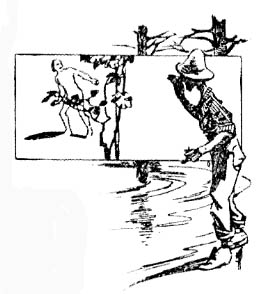
"Wilford!"
"Bill Smith."
"Put on your togs, and start."
"Why?"
"Because the people on that train 'll know you're a lunatic, and the police'll be after you from the next station they stop at."
"Oh, air divine and breezes swift of wing! I never thought of that. I'll be ready in a sparkle!"
I went back to the camp, and thrust myself into my scanty raiment in a few minutes. "Ready" I said, and lit up. "Shall we go across the paddocks, or along the line?"
"Along the line. The grass is too wet."
"All right. Quick march!"
"How far is it to Penrith?"
"I don't know, and I don't mean to. I'm content. Why should I worry myself with mathematics?"
"When are we going to have breakfast?"
"I'd forgotten. Next water."
So we halted and boiled oatmeal, and threw water over each other with the billies, and smoked. A meal is always a long ceremony with us. But the police failed to overtake the lunatic.
By the time we reached Penrith, dusk was close upon us, and The Boy was tired. We trudged down the street, in which the electric light had just been turned on, until we met a labourer with a child clinging to each hand. I nodded to him, and he sang out cheerily: "Good ev'n, mate!" We enquired the locality of the usual "camp," and were told it was a dirty old ruin about a quarter of a mile down the road.
"You'd better hurry up, or you won't find room," said the blue-eyed father, "'cause there's about thirty fellers there already, waiting for the Show to-morrow."
"Thanks, mate. Much obliged."
"No trouble. Good night."
We sat on a vacant block of land to consider our course. We got on rather slowly, for I am not used to practical thinking; so I gave Bill threepence and told him to buy a water-melon at the shop opposite. While we ate, a sturdy young tramp came to us from the west. He accepted a laconic invitation by flinging himself upon the grass and hacking a large slice from the melon. He was looking for a camp, and we mentioned the ruin. Incidentally, I remarked that we were going to camp on the other side of the river.
He said: "You'd best look sharp, or it'll be dark first."
I acknowledged the fact. He was kind enough to be interested in our movements, and I followed his lead. It is easy to take the cue from a man like this, and he feels all the better for his exhibition of insight and kindness.
"Goin' out west?"
"Yes."
"Lookin' for work in the sheds?"
"Um."
"D'you know how to shear, then?"
"No."
"Goin' rousin'?"
A nod.
"Bin out before?"
"No."
"My oath! It's yer maiden trip, eh? Well, I'll tell yer where y'oughter go first."
"Wish you would."
"Well, you go ter ——," and he mentioned a gibberish name which I have had no occasion to remember.
"What name?"
"He repeated it, and told me exactly where the station was, and how much I was likely to make. The information was valueless to me, but I was grateful. I set down the incident merely as another example of the readiness of people to help us on our way. In return, I could only tell him that the road before him was a good one; especially on the stage between Parramatta and Sydney. The country within a radius of twenty miles from Sydney is the bummer's happy hunting-ground. More than once, old Murrumbidgee whalers have told me that the Sydney folk are the kindest and most liberal in Australia.
We crossed the Nepean River, after lingering a few minutes to gloat over the long stretch of calm water, beautiful in the evening light with grey and green and rose and yellow and silver. Before us, like a rampart thrown up by giant revolutionists, stood the Blue Mountains, and above them moved a mass of deep purple clouds.
We sleep to-night on the foothills. I had to descend far into a rocky gully for water—sweet, sparkling water—and fell about grotesquely in the dark, to the annoyance of a squealing bandicoot. Meanwhile The Boy lit a fire. When I reappeared, scratched but triumphant, he proposed a gunyah.
"Looks like rain, you know."
"No matter. I hate building gunyahs."
"It means labour, eh?"
"It involves tearing down a lot of young trees."
"That's what I mean."
"Be blowed!"
REST
Rest, for the purple haze the bush bedims,
And, flushed with toil, flung loose along the west,
Day, sighing, feels within his languid limbs
Rest.
His brow by gentle breezes is caressed,
In weary sight the quiet landskip swims,
And silence of all blessings is the best.
With shadow now the gully overbrims;
And Night breathes to his peace-bedrenched breast
—The while her many-twinkling lights she trims—
"Rest."
|
At daybreak rain began to drizzle, but we heaped logs on the fire. As I threw a slab with shaped ends across the blaze, I instinctively looked towards the nearest fence. Then I turned my eyes on Bill, but he whistled to himself softly and busied himself with the tucker-bags. It was a matter of no consequence, for we were not on the road usually taken by trav'lers. We were on the first coach-track, an over-grown disused route. It was not likely that other tramps would suffer for what we did in that wilderness. I asked no questions.
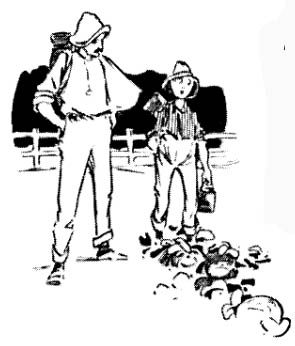 We made a damper and some
porridge. When it was too late, we discovered we were camped within
two or three hundred yards of a patch of pie-melons. It was a pity
but we neither of us cared to take a melon as an outside passenger,
and our vulgar verdict was: Full inside." So we made a start.
Before we regained the main road at Wascoe, we were drenched,
through having to push our way through rain-laden oaks; and every
now and then the grey sky darkened and a sharp shower drifted
across. But we took no heed of discomforts. Why should we?
We made a damper and some
porridge. When it was too late, we discovered we were camped within
two or three hundred yards of a patch of pie-melons. It was a pity
but we neither of us cared to take a melon as an outside passenger,
and our vulgar verdict was: Full inside." So we made a start.
Before we regained the main road at Wascoe, we were drenched,
through having to push our way through rain-laden oaks; and every
now and then the grey sky darkened and a sharp shower drifted
across. But we took no heed of discomforts. Why should we?
We met many trav'lers. Most of them were hurrying towards the Plains, for they wished to try their luck at the Penrith Agricultural Show. They all told us, in one phrase or another, that it was rainy weather, and a good many asked whether it was wet enough for us. The question is humorous in a mysterious way—must be, for each man smiled as he put it.
As we moved on, the showers became more frequent, until rain was the ground material of the weather and dry spells the patches. The roads consisted partly of sticky mud and partly of slush. When we felt hungry, we turned aside for dinner into a gully near Springwood, hoping to find a cave. But there was no cave. We started a fire with some bark and leaves which we found under a log, and then we cooked our dinner. I took off my clothes and spread them near the blaze, where they steamed like a mixen. Meanwhile, every drop of rain touched my bare skin with a tiny ice-cold finger. There is something strangely pleasant in that touch; but my clothes were as wet as ever when I donned them—heavy and clammy—and I was inclined to favour an early camp. The afternoon was well-worn already.
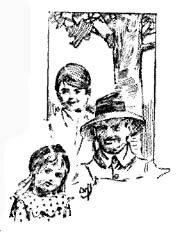 While we were passing a
cottage a little further on—a doctor's house, as I saw by the
brass plate—we noticed two children, a girl and a boy, on the
verandah. Suddenly the little lass hailed me: "Hallo, man!"
While we were passing a
cottage a little further on—a doctor's house, as I saw by the
brass plate—we noticed two children, a girl and a boy, on the
verandah. Suddenly the little lass hailed me: "Hallo, man!"
"Hallo, sweetheart!" I cried back; and meant it. God bless her soul of sunshine!
"How are you getting on? "I asked, assuming old friendship.
"Quite well, thank you," she replied gravely; "how are you?"
"Wet," I said. "Good-bye!"
"Good-bye, man!"
And we saw each other no more.
Is such an incident a trifle? Well, it may be, but the best of life is made of such trifles. I rejoice, and thank the Spirit of Love for them. I have been feeding for hours on the memory of that child's face and voice, and words cannot tell one who does not sympathise how glad I am that the little light-bringer is getting on "quite well."
When one is radiant with love, the children are immediately sensitive of the glow. They are naked to its influence. It is worth the while of philosophers to consider the causes of later slowness of appreciation. The lion will lie down with the lamb when all men understand the eternal Fact which gives their deepest meaning to these lines:—
"Man, a dunce uncouth, Errs in age and youth: Babies know the truth."
We searched gully after gully for a cave, but without success. I found a poor kind of shelter, on private property and well within sight of the proprietor's house. This possible camp was an overhanging rock, close to the ground, and partially sheltered by a rudely-built wall of loose stones. It was a wet and cramp-provoking hole at best. While I was examining it, somebody at the house caught sight of me and shouted warning. So we wandered off through the rain, and The Boy said thoughtfully:
"D'you know, Knight, I don't think I enjoy this tramping quite as much as you do."
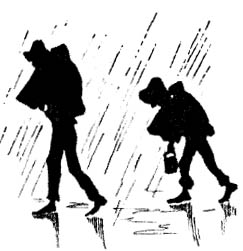 Most trav'lers, by the way,
avail themselves of the "boxes" on the railway platforms. I
consider them more cheerless than rain, and you cannot light a fire
in them. Even the intellectual refreshment afforded by quaint
pencil inscriptions on the walls does not atone for the dreariness
of those wretched boxes.
Most trav'lers, by the way,
avail themselves of the "boxes" on the railway platforms. I
consider them more cheerless than rain, and you cannot light a fire
in them. Even the intellectual refreshment afforded by quaint
pencil inscriptions on the walls does not atone for the dreariness
of those wretched boxes.
I slumped along with a light heart, knowing well that—though night was coming rapidly upon us—shelter awaited me somewhere. Truly, "the goddess Wyrd oft withholds misfortune from the man undoomed when his courage sustains him "; and I foresaw a fire and bubbling water. We met a horseman, and asked him whether he knew where we could find a roof to creep under. He looked at us sharply, and said: "I think not; I've had enough of you fellows about my place."
At that I grinned, and said: "All right, boss. You do run into some hard cases and spielers who burn fences and slope with your garden-stuff, and you ain't to blame if you can't see we're not that sort. But don't you know of any cave or old shed about? We ain't particular about sleeping in your pig-sty."
Then he grinned too, but did not soften much. "I'm afraid I can't help you," he said; "but there's a camp of workmen in a cottage about half a mile on. They might find a place for you."
We found the house, and, when I looked in at the warm room, I was glad to notice that it could easily accommodate many more lodgers without inconveniencing the occupants who were lounging about the fire. A hulking black-browed navvy caught sight of me. I nodded, and asked: "Any chance of a camp here, mate?"
He replied: "No, I don't think there is—mate."
"Mate" was an after-thought."
"Any camping-place further on?"
"Dunno."
Another man, who was kicking the blazing logs on the hearth; desisted from his occupation and spoke over his shoulder: "Go to the station—Linden's the name—a piece down the road, an' then foller the line till yer come to a red gate. Go through the gate to the right an' down the track straight ahead of yer. There's a big cave there, they call King's Cave."
"Thanks, mate. So long!" And again the rain received us.
We stumbled along in the dark, found the red gate, followed the track, and there, just over the edge of the hill, was a sandstone cave that might have accommodated fifty men. We were housed at last. The rain got up a demonstration for us on the spot, and came roaring down in a solid mass. A cascade leaped from the hill across the open archway of our home, and the bush was lost in the jaws of the growling storm. We found dry wood, and soon the deeper end of the cavern was faintly illuminated, and we lay on our blankets and swallowed hot pea-soup.
ERRANT LOVE
Fling off the threads that bind
The limbs of Love to-day,
And let him, unconfined,
Go laughing on his way
In bush and street, and bid him greet
All souls by whom his guided feet
Instinctive stray or stay.
And while he speeds along,
Or wanders left or right,
Let certain speech or song
From his warm lips take flight,
Lest, like a bird that flits unheard,
He pass, for lack of spoken word,
Unnoticed in the night.
|
We have not marched many parasangs to-day. In fact, we are only four miles from King's Cave.
It rained all the morning, so we stayed where we were, and watched the occasional shafts of sunshine sweeping over the mountains. There was a little well of clear water in the cave, and, with one drawback, it was a model abode. The floor, dusty and barren as it looked, was the realm of a mighty race of fleas—fierce, tiger-striped little creatures, which would leap in battalions upon your hand and arm as you stooped to gather chips. I was barefoot, and my trousers were rolled to the knee, and upon one of my legs I counted an impi of twenty-eight, which had rushed to the assault as one flea. But they did not annoy us much. A flea is only a nuisance when he persists in exploration.
We bade farewell to the hungry hosts in the afternoon, and walked in pale sunshine to Hazelbrook. Here we bought a loaf of bread, and were directed to another cave. This other cave is much smaller than King's Cave, and is less comfortable, because of huge rocks which lie about the floor. Two whalers were here before us; one, an old cooper, who was sitting on a square block of stone and reading an ancient newspaper with the help of spectacles; the other, a grey-bearded nondescript with bulging eyes. Water dripped briskly from the lip of the cave into a kerosene tin, and lying on one of the discomforting masses of rock were a rusty iron dish and a piece of soap.
The man with bulging eyes told us compassionately that these were "hard times," and asked countless questions concerning our past career and our plans for the future. The old cooper, on the other hand, modestly gave us information about the road before us, and then fell to reading his newspaper again. We were still going west to find work as rouseabouts. We bestowed the lie gratuitously on many a chance-met wayfarer. It is useless to ask why, and it is unnecessary. A simple explanation like that is far more likely than the truth, Heaven knows.
While we were erecting little defences against the incursions of the man with bulging eyes, a young man with a brown beard and a spotless suit of clothes appeared on the scene. He had been bumming the township of Hazelbrook.
"Visitors?" he shouted as he came round the corner.
"Visitors," I nodded.
"Well, I hope they have the spondoolicks," he said, by way of jocular enquiry.
"They'll pay for their lodging next time they're round," I ventured, entering into his mood.
"Always the way," he said, "always the way I'm too soft-hearted for a landlord." And he put down his parcels and laughed at his own humour.
We sat round the fire after tea and diligently smoked. I was reading The Song of the Redwood Tree, when the old cooper interrupted me:
"What's the book, young man?"
"Poetry. Walt Whitman's Leaves of Grass."
He nodded, blew a long stream of smoke at the fire, and plunged head-foremost into a string of reminiscences: "I remember a clurk I met at Junee. He was a clever chap with a pen; you wouldn't believe. He told me he was goin' down to Melbourne. He had a son down there, that was a tutor in one o' the colleges—taught, you know, at the University."
"Why didn't his son send him his fare?" asked the brown-bearded man.
"P'raps 'e did," interposed the man with bulging eyes, "'n' th'
ole man drunk it." 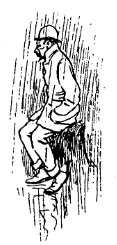
"Not him!" said the cooper. "I don't know how it was. Maybe the son was too well orf to notice his father at all. Anyway, we were camped in the bush, an' it come on to rain. He hadn't any tent an' no more had I, an' there wasn't no cave handy, like this. So I says: 'I'm orf!' an' told him to come, too. But not a bit of it! He had some books in his swag, an' he was dead frightened he'd get 'em wet. ' Well,' I says, 'please yourself. There's plenty more books in the world; but ef your binding gets rotted, you'll have to wait till the last day before you can get a new one.' But he only said he musn't wet them books. An he shoved his swag into a holler log, an' sat on top, shiverin'. So I left him an' went to the pub in the town—I don't know if you know Junee?—The Warrigal Inn. It was kept by old Tom Hourigan in those days. Many's the time he's done me a good turn since; but I didn't know him then. I went to the door, an' asked him ef he could give me some kind o' shelter from the rain, an' he took me into the kitchen an' told me to dry meself. Then he says: 'Have you got any money?' 'No,' I says. 'Well, you'd better have a bit of somethin' to eat,' Tom says, an' he got the girl to set out a plate an' a good dinner. After a bit, he looked at me suddenly an' says: 'Ain't you got a mate?' 'Why, yes,' I says, 'I have; but he's sittin' on a log in the bush, because he don't want to wet the books in his swag.' So Tom says he must be a fool, an' any man who didn't have the sense to come an' ask for shelter didn' deserve to get it."
"Quite right!" said the brown-bearded man.
"But pretty soon he turned up, an' I never seen anybody look more miser'ble. He was wet through, an' so was his swag—books an' all. An' his forehead was wrinkled an' the corners of his mouth twitched back, an' the tears were runnin' down his cheeks. But he got a bit better when he had some tucker inside of him, an' Tom made him take off his clothes to get dry, an' lent him a suit of his own."
Here the old cooper sucked vigorously at his pipe, and discovered that it had gone out. He, therefore, took a burning stick from the fire to light it again. He satisfied himself that it was well and truly lit, pressed down the glowing tobacco with his little finger, and, without looking at us, unexpectedly continued his story:—"He had a way of burstin' out cryin' every now an' then. An' the longer he didn't have it, the longer he had it when it come. I remember, when we got down to the border, the man in the punt wouldn't take us across the river. It used to be tuppence to get across then, an' he wouldn't start till we showed him the money; an' of course we hadn' got it. Well,' says this fellow I'm tellin' you about—this clurk—'what ever are we goin' to do now, George?' An' I says: 'Why, there's only one thing to be done. Ef we can't get across in the punt, I suppose we can both swim.' I meant it for a joke, you know, but I'd forgot he hadn' been cryin' for two days. He sat by the side o' the road an' sobbed like a baby, an' the tears came drippin' out between his fingers. It made me a bit angry, so I says: 'What's the matter now?' An' he says: 'I can't do it, George. It ain't no use. I can't swim.' 'All right,' I says, 'I suppose you don't want me to wait here while you learn.' Then he nearly choked himself cryin', an' he got down on his knees, all of a heap, an' he caught hold o' the leg o' my trousers, an' says: 'For Gawd's sake, don't leave me, George!'—like that. An' his hands were shakin' like the water in the top o' that tin. 'Why not?' I says; 'I'm gettin' an old man, an' I can't afford to be wastin' time, waitin' on the edge o' this river.' But he gripped tight hold o' me, an' sings out: 'I can't get on without you, George. Ef you leave me, I'll die before I get to Melbourne.' An' I says to him: 'How did you get on before you met me?' 'I don't know,' he says; Gawd help me, I don't know!' 'Well you must be a baby,' I says; 'you might uv known I was jokin'. Do you think any man in the world could get across just here by swimmin' with a swag an a billy.'"
He paused for so long that we thought we had come to the end of the yarn. But when the brown-bearded man asked: "And how did you get across?" he made a fresh start.
"A chap come along on a horse, an' I says: 'Good day, sir' 'Good day to you,' he says. Can I have a word with you?' 'Oh, yes. What is it?' An' I told him. 'Here's two fellers stopped on their way to Melbourne for the want o' four-pence,' I says, an' one of 'em come all the way from Sydney to see his son at the University.' That was all right. He paid sixpence, an' we all went across together. We got on without any trouble, till we come to Euroa. There was a brewery there, an' I says to the clurk: 'I'm goin' to try an' get a job at my trade here, an' you can wait till I tell you how I get on.' An' he says: 'Well, I hope you don't get any job.' Actually said that, after all I'd done for him. An', mind you, I had to get all his tucker. No bummin' for him. He said he wasn't come so low that he'd beg; so I had to beg for him. An' then he hoped I wouldn' get a job. I never knew a more ungrateful chap. 'Well, I hope I do,' I says, 'an' don't you show yourself at the brewery till I call you, neither; 'cause of you do, we won't be friends—that's all.' An' he kept away all right. I went to the brewery an' saw the boss—Wild, his name was—an' told him what I wanted. 'Well,' he says, 'ef you're a cooper an' not a blanky fool, you're just the man I want;' an' pretty soon we had the affair fixed up. Then I says: 'I s'pose you don't happen to have another job of any kind open? I've got a mate outside that wants to get to Melbourne.' 'No,' he says, 'I don't want any more hands.' 'Then p'raps you'd give me a week's wages in advance,' I says, ''cause he's a helpless sort o chap, an' he ain't got no money.' 'I s'pose he can't figger accounts?' he says. 'Yes, he can. That's just what he can do. He's a clurk.' 'Well, where is he?' I just stepped out to the gate an' whistled, an' waved my hand like that, an the clurk came in. Well, the end of it was that Wild took him down to the cellar an' showed him the door. It was a big door, covered all over with chalk marks—letters an crosses an' curls an' things. You see, Wild couldn't figger or write, so he made them marks on the door, so's he could understand 'em. But he couldn' make up the accounts that way, an' he hadn't anybody to do it for him. We lifted the door orf its hinges an' took it into the office, an' Wild read it to the clurk. But it took him three days to straighten out the accounts. Then, one day, I was workin' in the yard, an out come the clurk, an he says: 'I'll have to be sayin' good-bye, George. The boss has got me a job to take a lot o' sheep all the way to Melbourne.' 'He's a good sort,' I says, for I knew Wild 'ud see the chap was well paid. An' then I says: 'I s'pose he gave you a present, too.' An' he had. He'd given him three quid. So the clurk went orf, an' left me workin' at the job he hoped I wasn't goin' to get. But, before he went, he gave me two o' the books out of his swag, with a bit of writing beautifully put in both of 'em, with curly marks all round." The old cooper indicated lines of writing with his pipe stem, as he slowly repeated the words of the inscription: "From—then he had his name—to Mr.—then he had my name—as a slight but sincere token of his undyin' gratitude for countless acts o' kindness on the road between Junee and Euroa—an' then he had the date. I never knew of he got down to his son all right, but I reckon he did. I wasn't sorry when he was gone. He cried a bit when he left."
"What did you do with the books?" enquired The Boy.
"Oh, I read 'em—they weren't much good—an' then I gave 'em to Mrs. Wild."
The old cooper went on to describe his experiences while he was employed by Mr. Wild. The brown-bearded man retaliated with a tale of his adventures in Dubbo, where he had been grievously swindled by his employer. Then the two swapped lies, until the rest of us were tired out and got between our blankets. As I set down these last words, the old cooper, having vanquished his rival, is spreading his blanket and singing Star of the Evening. All the others are lying on their backs about the cave; and the man with bulging eyes is snoring tremendously. The brown-bearded man folded his clothes carefully, and hung his neatly-indented hat upon his boots. He has no blanket, but has covered himself with a couple of old sacks, and looks like the unidentified corpse of a suicide. The night is cloudy, but no rain is falling.
THE BOND OF THOUGHT
I wonder do you think of me
When I of you am thinking.
With open eyes that hardly see,
I wonder do you think of me;
And now from Love's deep well are we
A draught together drinking?
I wonder—do you think of me
When I of you am thinking?
|
At breakfast the brown-bearded man said:
"You fellows came through Woodford, I suppose."
"We did."
"Did you see the big Government Camp there?"
"'M," I grunted, with my mouth full.
"Any chance of tucker there?"
"Didn't try."
"Oh, they'd give you somethin'," said the old cooper; "they're only poor men."
The sun was shining, and the road was drying rapidly, so we up-saddled early. Near Lawson, we met a family adrift. First of all came a covered waggonette, driven by a stalwart, independent-looking man, beside whom his wife was sitting and suckling an infant. In the back of the vehicle a couple of children were nestling among the blankets. The rear was brought up by a healthy jolly lad on a bare-backed pony. Fair luck go with the party, and happiness sit by their camp-fire! The sight of them was good.
At Wentworth, The Boy proposed that we should have a drink at the Hotel, and in we went. Beer is one of the biggest items on our invisible account-sheet, I am afraid. As we sat with our pints beside us, I remarked: "I've been in this pub before."
"When?" asked Bill.
"One summer, a year or two ago. I was with old Colonel Turbot on a sort of exploring expedition, and we struck the line just here. He's a queer-looking fellow, old Turbot—tall and bony and dark, with little bright eyes, and a tuft of hair coming down to a point on his forehead. Reminds you of a cockatoo. He was a bit tired, so, after he'd swamped his beer, he lay down on a horsehair sofa in the parlour. It was pretty late in the day, and the blinds were down. By-and-bye, a portly old woman came into the room and peered about in the dusk. I suppose she could just make out a figure on the sofa, for she looked that way and said: 'Are you there?' and Turbot said he was. Then she grabbed a chair and brought it over to the sofa, and set it down close to Turbot, and sat on it. The Colonel watched her a bit nervously, because he saw how easy it would be for the lady to make out a case against him. He lay still, and determined not to shift, whatever happened. She leaned forward with her hands on her knees, and said: 'Do you know, I can't make out what's the matter with Sarah!' Turbot, knowing that, whatever Sarah's condition was, he could not be suspected, brightened up at that, and said, with the usual polite affectation of interest: 'No? Really?' 'No,' the old woman said; 'she can't stand.' Turbot thought Sarah was probably drunk, but he only said: 'Well, hadn't you better speak to the proprietor about it?' And, of course, that burst up the show."
"How do you mean?" The Boy asked.
"Why, because she thought he was the proprietor. Drink your beer."
We decided to turn aside from the main road for an hour or two, and to have dinner at the Falls. We went to a store and purchased material for the meal; and the man at the counter thought we were mad, and evidently felt uneasy until we had paid him. We bought a loaf of bread, a pound of onions, a pot of jam, and half a pound of butter. It was a gorgeous meal, and Wentworth Falls never looked better. We sat on the cliffs, and let our gaze rest upon—
"An inland sea of mountains, stretching far In undulating billows, deeply blue, With here and there a gleaming crest of rock, Surging in stillness, fading into space, Seeming more liquid in the distance vague, Transparent melting, till the last faint ridge Blends with clear ether in the azure sky In tender mauve unrealness; the dim line Of mountain profile seeming but a streak Of waving cloud on the horizon's verge."
And the sublimity of the scene was enhanced by delightful dreams of anticipation—fair children, begotten upon the soul by the scent of frying onions.
We did not visit Katoomba Falls, because we did not wish to be benighted on the heights. Instead, we turned off at the Explorer's Tree, and descended Nellie's Glen, a beautiful, rock-walled pass to the Valley. It is in the lower end of the Glen that we are camped. We are under the lee of a sloping rock, close to the creek. The Boy is convinced that we shall be caught by the police and imprisoned during Her Majesty's pleasure for lighting a fire to cook our tea. But Her Majesty may rest in peace. We are very careful, and not a single fern-frond or twig or leaf have we plucked to soften the hard ground beneath our hip-bones. The law has no terrors for me, but I know that every form of sin is an insult to Beauty. To offer Her an undisguised affront is too serious an offence, even for an irresponsible tramp. I dare not defile the very shrine of the goddess, at the moment when her blessing is like sunlight on my spirit. When I feel a pebble grinding between my ribs, I put my hand beneath me and pull the offending fragment out, and murmur: "Oh, blast the!—! I apologise. For Thy sake, most Holy Queen, sweet mistress of my soul!" and I throw the lump of stone into the creek.
I wonder what Marjorie is doing to-night. Within two days, if Arthur keeps his word, I shall have news of her. This life of freedom is a symbolical dream of our love, a shifting pageant of the union of souls and bodies. The bubbling mirth of a creek, the majestic sloth of a sunlit cloud, the ripple of leaves, the interchange of swift glad song by hidden birds, the aromatic scent of certain bush growths in the brushwood—these, and a thousand other appeals to the senses, overwhelm my whole being with subtle suggestion. I am alive, and I love; and the world is a mystical mirror of my inmost self. Why do I thrill with fierce desire at the mere sight of green-fern-fronds unrolling in the sunshine? The Life of the World sweeps through me and over me, and I am a-tingle with passionate sympathy. Even when I lie drowsing by the fire, strong passion couches beside me with strenuous outstretched limbs. And because I have not caged my heart, and taught it parrot-cries of blasphemous commonplace, I am driven out with polite horror and respectable denunciation. If you were here to-night, my true Love, I think I could convince you—if you were here, my Sweet—if you were here.
A RIME OF THE SHORELESS SEA
Sea without shore stretching over and under us;
Knowing too well for exploring and noting
Infinite distances where we are floating,
Knowing that naught can betray us or sunder us,
Swing we, my own,
Borne by the current of passion that carries us,
Sweeps us and pauses, and whirls us and lingers,
Brings us together, attracted, and marries us,
Swirled in the wake of omnipotent fingers,
Always together, and always alone.
|
As we swung gaily across the undulating country which forms the bottom of the Valley, we were greeted at every step with cries of welcome from all kinds of birds. Parrots of various species screamed and chattered, and magpies carolled in the trees. As we were passing a piece of swampy ground, three spur-wing plover ran off, clacking. The kookaburras burst into long peals of laughter. I laughed, too, wildly and plenteously, to the amazement of The Boy, who asked, "What's the joke?" And when I shouted, "Life!" and pointed to a scurrying rabbit, he said he couldn't see anything so funny about it.
We had a little difficulty in crossing Cox's River, which was somewhat swollen. There is no bridge, and the gigantic oaks which have been felled from time to time across the stream have all been swept away. Bill sniffed at the Cox, and called it a dribbling creek, but it took him an hour to get from one side of it to the other, with his swag and his clothes in one big bundle on his head. There are a couple of selectors' huts near the ford, and a half-caste woman strolled down to the river bank to watch us. But she offered us no advice, and I mutely thanked her for her forbearance. She was the last person we saw to-day. There are not many houses near that bridle-track.
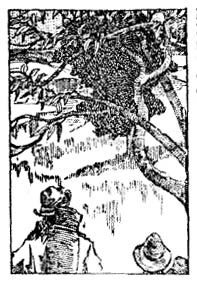 As we climbed the deceptive
slopes, after our passage of the Cox, the Boy announced every ten
minutes that he had sighted the top. Each time he discovered his
mistake he began a new search for the summit, and prepared himself
a fresh disappointment. But we did surmount the hill at length and
reached Little River about an hour before sunset. We had a meal,
and discussed the situation. The result was that we started the
arduous ascent of the Black Range at nightfall.
As we climbed the deceptive
slopes, after our passage of the Cox, the Boy announced every ten
minutes that he had sighted the top. Each time he discovered his
mistake he began a new search for the summit, and prepared himself
a fresh disappointment. But we did surmount the hill at length and
reached Little River about an hour before sunset. We had a meal,
and discussed the situation. The result was that we started the
arduous ascent of the Black Range at nightfall.
We toiled up the steep mountain path for about three miles, and then arrived at the saddle where the track turns to the right along the back of the range. We pushed on more rapidly. It was very dark, for the night was cloudy, but we found our way by watching just ahead for the wider glades, and by keeping the foot-worn ground beneath us. If we strayed a yard from the track we could feel grass and dead leaves under our feet. We strode along at the rate of about three miles an hour. We could hear the wallabies scattering before us and thudding through the scrub into the gullies, and once we heard the wail of a bear. Here and there a log lay across the track, and we produced confused crashing and bumping sounds in the gloom, and murmured words of mystic import. It was a weird journey through a desolate land. There was not a drop of water to be found, and we were parched with thirst.
Suddenly the light from a frightened peeping star gleamed in reflection from the ground before me. I grasped The Boy and flung him back, lit a match, and knelt upon the soil. Almost an inch of water had collected in a hole left by a horse's hoof. We drank by turns, lying flat and sucking up mud. A quarter of a mile further on we came to a swamp full of clear pools.
By the time we emerged from the bush upon the Mount Victoria Road, thin veils of mist kept rising from the bottoms and trailing across the ranges, rendering the darkness clammy and ghostly in the drip-starred silence. We turned to the left, and went on until we discovered a grass-hidden creek of running water. There is an old gravel-quarry near the creek—a tiny amphitheatre, where the workers have dug out earth and gravel to bind the loose metal of the road. Here we have pitched our camp. There is abundance of firewood, though there is no shelter from the threatening sky. We are roasting ourselves at a splendid conflagration. Actually, we found a stack of squared logs in this little stronghold. Everywhere we meet the kindness of men and the bounty of the gods.
It rained, during the night, until our blankets were wet. Then the rain gave place to a thick, penetrating fog. We rose before dawn, erected a precarious clothes-horse of dead saplings, and hung up our blankets to dry. Perhaps you think it easy to dry a wet blanket in a fog. There is no difficulty in heating the thing—or even scorching it—but it needs much careful manipulation before it becomes even decently damp. It was a long while before we felt justified in rolling our swags and resuming our march.
Instead of following the main road in all its windings round the mountain-side, we took a track which runs straight along the ridge. A keen wind, which was rapidly blowing the mist away, brought every now and then a slight sweeping shower of fine rain across the ranges. The Boy was full of talk; and every time I had heaped a card-castle of thought, his breath blew it down.
First it was: "My hands are very cold. I don't know if yours are."
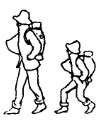 Of course he didn't know,
and there was no good reason why he should. The temperature of my
hands could not be a question of pressing interest for him. And, at
all events, his remark called for no reply.
Of course he didn't know,
and there was no good reason why he should. The temperature of my
hands could not be a question of pressing interest for him. And, at
all events, his remark called for no reply.
But he persisted: "I don't know if yours are." He spoke louder, but I retired deeper into my thoughts and was silent.
After a few minutes, he returned to the attack:
"I suppose your hands are pretty cold."
The supposition was a harmless one. I let him suppose.
He nudged me: "ARE THEY?"
"What?" I said wearily.
"Cold."
"Are what cold?"
"Your hands—are they cold?"
"No."
He fell into silence for five minutes. But he was only composing a new catechism.
"We're pretty near Jenolan now."
Blank silence on my part. The statement did not call for contradiction.
"Aren't we?"
"Aren't we what?"
"Near Jenolan."
"Yes."
"Well, I'm hungry. I don't know if you are."
A pause.
"I don't know if you are."
A long pause.
"ARE YOU HUNGRY?"
"Yes; I'd be glad of a bit of bread."
"We may as well have breakfast, then...Don't you think so?"
"No. If we have our usual luck we'll get breakfast this morning without working for it. Don't ask how; you'll see in time."
At nine o'clock we arrived at the settlement of Jenolan, and straightway passed through the lofty natural tunnel which is known as the Grand Arch, and sought the cottage of one of the Cave Guides. A coach-road is being made through the Grand Arch, so that visitors from Mount Victoria may drive through the hill, and into the valley in which the Accommodation House and its accomplices lie like dregs at the bottom of a basin. The whole place is resonant of destruction. The click of hammers and crowbars and the thud of pick-axes are incessant. And at intervals a blast is fired, a shower of slate-blocks rains into the gully, and the roar of the explosion crashes from hill to hill, and rushes, rolling and swaying, through the valleys, till it dies upon the mountain-slopes like a spent wave.
We climbed up the spur to the Guide's house, and I knocked, but nobody came to the door. The worst of it was that I could hear the tinkle of spoons. We went to the back of the house, and a chained dog frantically danced in a semi-circle, yapping and gurgling his regrets at not being able to accord us a warmer welcome. The brute's master heard the noise and came out, with his mouth full of bread and butter. As soon as his tall handsome frame choked the door-way, I bailed him with enthusiasm. His breakfast was not over.
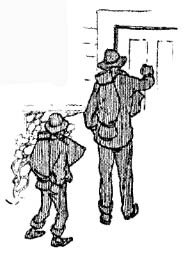 "Hallo, Voss!" I said.
"Hallo, Voss!" I said.
"Hallo, Knight I When did you get here?"
"Just arrived over the mountain. We came to see if you could put us up to a hole in the rock where we could camp."
"Haven't you a tent?"
"No."
"The Coach-house is the best place I know, but they won't let you camp there. I don't know what you're to do."
"Right! We'll look round for ourselves."
"You know your way about, and you're not likely to do any damage. But they're a bit strict about the Arches, so you'd better keep away from them. I'll see you later. I'm having breakfast now."
He nodded and left us. We stared at each other and grinned ruefully. There seemed to be no course open to us except that of cooking our own tucker. But a woman thinks of everything, and Voss is a married man. Before we had turned away, he reappeared and said: "Come inside, and have a cup of tea, Knight." And we went inside and astonished him. When we descended to the Coach-house, we were warm with the glow of inward satisfaction.
The Devil's Coach-house is a huge cavern or arch, through which in flood time runs a creek, violently struggling, tossing tawny arms, and fighting its passage over and between the boulders which block its course. But at present the bed of the creek is dry. The roof of the Coach-house is said to be two hundred and seventy-five feet from the floor. In the walls are innumerable ledges, crevices and caves, and from the roof hang stalactites of pink and green calcite. The wonderful blending of colours in this magnificent hall can only be appreciated after loving study, but the grandeur of its proportions should strike even the most flippant dumb. And in a nook of this home for gods, we made our insignificant camp, like a couple of mice in a cathedral.
Throned on a great block of limestone that must have crashed from the roof many ages ago, I reclined and read Arthur Seaton's letter:
Dear Knight—
Can't make out the lay of the land here. Something seems to be
wrong, but I reckon you know more of that than I do. Last night I
went over to Traills'. Marjorie's cheerful enough, and while I was
there she was so lively she didn't seem able to sit still for five
minutes at a stretch. She'd play a bit, and then slap down the
piano-lid and pick up a book. Then she'd drop the book and run
outside to chuck stones for the dog. And she was ready to laugh at
nothing at all. When I told her I was going to write to you she
said, "Where to?" and before I could answer she said, "Oh, never
mind. I don't want to know!" When I opened my mouth to speak, she
held her hands over her ears and said, "Don't tell me—promise you
won't?" And when I promised she went outside again. Her mother
asked me just afterwards where you'd gone, and I told her as much
as I knew. And there was Miss Marjorie in the doorway, looking
awfully disdainful and careless. By-the-bye, her mother told me the
girl seems put out about something. "But she's been working about
the house, by fits and starts, as though nothing could make her
tired. I can't make her out at all." That's the report, sir. The
old man kept watching her very suspiciously, and he was pretty
short with me. If anything's wrong—anything you didn't make proper
allowance for—I'd advise you to keep out of the way for a bit.
Lassie's pups turned out all right after all—five of them. I'll
keep the best for you. Be good.
A. S.
So Marjorie is restless and excitable; and she wanted hints from which she could construct a likely environment for her dream-portrait of me. The sleepy-looking tatterdemalion who was sprawling to-day on that lump of rock, is an Emperor in disguise, and a man whom the happiest mortal in the world might envy.
In the afternoon we visited the Lucas Cave. I have neither ability nor desire to describe the Caves. Others have tried often enough; and I must refer you to the orthodox guide-books for a thoroughly inadequate and misleading account of them.
MY DEAR
I called you My Dear in a letter,
When you were a free-hearted child,
As blithe as the wind and as wild,
And you flushed with disdain—knowing better—
"His Dear! and since when?" and a stroke of the pen
Stabbed the word by which "Dear" was defiled.
Now strike out the word, I renew it;
In letters provokingly clear
My claim I reiterate here.
But no stroke of pen can undo it—
For the word is a sign that our spirits combine;
You are mine, for you love me, My Dear.
|
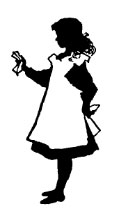
We have been through the Imperial Caves to-day, and have seen that they are not bad. Personally I prefer daylight to underground gloom, but all experience is enjoyable, and a procession of idiotic people stooping their shoulders and slipping, with candles in their hands, about a damp chilly passage, is worth seeing. I wonder why they take such delight in tracing resemblances between the wonderful formations of carbonate of lime and such objects as bullocks' tongues, dead fowls, politicians and entrails. And why is there a funny man in every party—a man who with daring originality makes the stupid jokes which the guides have to hear twice a day for ever and ever?

Our money is vanishing too quickly. When we started, we had thirty-five shillings. Now we have only twenty-seven. It must be remarked that we had well-stocked tucker-bags when we left home, and we have no idea how long we are likely to be away. I casually mentioned the state of our funds to The Boy.
"My word!" he said; "we may have to work for our living before we get home."
"God forbid!" I said quietly. And I saw that he was impressed by my simple piety.
Later in the day he came to me, beaming, with two shillings on his palm.
"Been humping visitors' luggage for tips?" I asked indifferently.
"No; one of the 'workers' gave 'em to me."
"What!"
"Yes. One of the fellows at the forge in the Arch. He said: 'Are your legs tired, my boy?' and threw me these."
"And you grovelled in the dirt and picked 'em up?"
"Yes. Had some trouble, too. One of 'em slipped under the dust, and I couldn't find it for a while."
"You shouldn't have taken 'em."
"Why not?"
"Because the man is poor, and coins sweat. If you'd got 'em from a dandy visitor, it wouldn't have mattered."
"Well, it's too late now."
"To give 'em back?"
"Oh, I'm not going to give 'em back."
"All right, Bill. It's your affair. But you can't spend 'em this trip, unless you go for a spree by yourself."
It was all very well to say that, but every time I walk through the Arch I sneak past the forge with my eyes on the ground. It is unreasonable, but I am afraid to meet the eyes of the blacksmith.
Just below the Devil's Coach-house, a creek of clear cold lime-water emerges from a rock, and runs rollicking down the gully, smoothly muscular on the even lengths of its channel, brawling among rocks where its course is narrow and rugged, leaping from time to time over bevelled cliffs into lucid pools. Surely one should be able to read through so transparent a medium the life-secrets worked by Nature in mosaic upon the pebble pavement. Four years ago my tent stood in the gully, and daylong I heard the voices in the waters. Over and over again, I would glance towards the Arch, expecting to see a troop of visitors coming down the glen. Over and over again, I saw nothing but rocks and trees and the hurrying creek. In the middle of the night, I would wake suddenly, rise on my elbow, and listen. And how those voices lit the silence! Musical laughter and sweet speech filled my soul with longing. I knew that where the creek poured out into the hollow night and caught the star-pictures in its dimpled hands and crushed them, scattering fragments, the pure naked forms of unearthly maidens played invisibly. I knew those perfect women spoke to me; that they had a message for me—a secret of joy as clear and complete as a flawless crystal. But in vain I strained my ears to catch the elusive sense of those frank utterances. I was upon the very verge of a great discovery. No distinct word reached my ears, and yet the whole meaning of the sounds was only just beyond my grasp. And still I hear voices calling, calling, calling in the creek. But they have undergone a change, unaccountable but unmistakable. They are no longer the dulcet tones of laughing women, but the deep determined speech of athletic men. But more than once I have caught the keyword of their message. And I know that the time will come when my ears will be opened. For the word is LOVE.
|
MOONLIGHT
Stars that wake when the dusk is flowing |
We were wakened by voices in the Coach-house, and rapidly clad ourselves in shirts and pants. Then I kicked together the glowing coals of our sinking fire, and threw on a few sticks. We felt then that we were, in a manner, standing to attention, and we awaited our visitors calmly. An old wood-carrier clambered up the track and approached us, followed by a delicate-looking boy of about sixteen years. After we had exchanged courtesies, the carrier explained that he had brought his son to see the Coach-house, and then went on to discuss the important question: To whom belongs the honour of having discovered the Jenolan Caves? He was inclined to give it to MacEwan. And this, briefly, is the story, of MacEwan:—
About a quarter of a mile up the creek, the bottom of the gully widens into a grassy flat, which is known as The Little Hole. On this bit of alluvial lived, long ago, an assigned man who had escaped and had taken to the bush. His name was MacEwan. He had built himself a hut, and he used to grow corn and vegetables. But he was not entirely independent. When he ran short of tea or sugar or gunpowder, he would ride to the main track, and rob Whalan's bullock-drays. Whalan, who thought it better to lose a little than to risk all, submitted. One day, MacEwan's mate—who shared the hut—was foraging for himself, when he came across three or four horses of good breed and in excellent condition. They were too valuable to be lost. He turned his own steed loose, mounted one of his new acquisitions, and drove the rest to The Little Hole. Later in the day, MacEwan crossed his trail and thought from the appearance of the hoof-marks that the horses belonged to the police. When he subsequently saw his mate's horse running in the bush without a saddle, he guessed that its owner had treacherously turned Queen's evidence to save his own neck or for the sake of a reward.
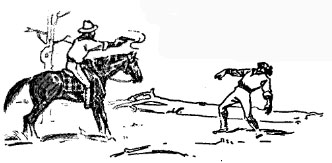
So home rode MacEwan and shot his brother bushranger at sight. Some time after the occurrence of this regrettable mistake, MacEwan was addressed in insulting terms by one of Whalan's drivers. He let the man go, but promised to shoot him if he met him again. The driver resigned. MacEwan was disappointed, but implied that another driver would do almost as well. Meanwhile, he disabled Whalan by stealing half his cattle and all his yokes. The iron portions of the yokes had been imported from Sydney at great cost of time and money. Whalan's patience was smashed, and he reported the freebooter's whereabouts to the police. Half a dozen mounted troopers approached The Little Hole by night. They camped on the hills. At dawn they charged down the gully, whereupon MacEwan, thinking that his horses had stampeded, jumped out of his bunk and rushed into the open air. He was clad in a long white garment of fine linen, with frills on the sleeves, bosom and hem, and on his head was a lady's night-cap. Before he realised what had happened, he was in the hands of the police. Among various stolen articles of attire found in the hut were six dresses, with dainty underclothing to match. At his trial he swore vengeance against Whalan. Ten years later a crop-haired horseman begged for shelter at Whalan's house. The bushranger was greatly changed, but Whalan recognised him. Australian hospitality is not a phantom sentiment. MacEwan shared the settler's supper and lodged during the night in his house. In the morning he rode off into the bush. The story is incomplete, but I tell it as I heard it.
A party of tourists came through the Coach-house this afternoon. There was an old gentleman with an immovable eyeglass and a fixed smile, and there were two young swells. With them tripped a young lady of some thirty-nine midsummers. Her manner was vivacious, her costume gorgeous, her hair golden, and her complexion bloomy. To save her clothes from being draggled, she had gathered a great part of her skirt into a bunch behind her; and beneath this hump of millinery she had passed a strap which she buckled in front just below the level of her diaphragm. She looked like a giddy old emu.
I happened to be sitting by the fire reading a copy of "King Lear," which I had conveyed from the parlour of the Caves House. The more inane of the young dandies was agape with curiosity. He picked his way to me and stood simpering. I looked up.
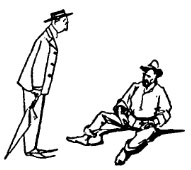
"Good afternoon, my man," he squeaked bravely.
And I rose, removed my hat, and humbly said, "Good afternoon, sir."
"I see you're reading."
"I was, sir."
"May I see your book?"
"Certainly, sir."
"King Lear, by William Shakespeare?" Turning the leaves: "Isn't this rather too deep you, my good fellow?"
"Well, I don't know, sir; I understand a here and there and I guess at the rest."
"Really, I should have thought it above your head, you know. In fact, I don't know that I should care to read it myself."
He rejoined his party, and I could hear him babbling to his fellows: "Most superior man; so polite; knows his place and that sort of thing; reading Shakespeare, you know—Shakespeare, by Jove. "
They took the path to the left and went up the hill; but they were still in the neighbourhood. Suddenly two or three stones came clattering through a hole in the roof and crashed into the bed of the creek. I knew that the floor of the cave was not visible from where the stone-throwers were standing, and I felt annoyed, though I was not actually in a position of danger. So I sang out politely: "Would you mind chucking rocks at somebody else, please?" A dropping rain of pebbles was the only answer. I shouted, less politely: "Stop that, you jackasses! If you have only a spoonful of brain, you might as well exercise it." Straightway an avalanche of limestone fragments thundered down. Thereat I became almost rude. I said: "Damn and blast you, you infernal gory blanks! If you can't act with more flaming sense, I'll blanky well report you to the crimson Department. I can identify you. There's a sanguinary old Barbary ape, two carnal poodles, and a skittish cassowary." And then peace descended upon the Devil's Coach-house.
The Boy was away while this was going on. Before he returned, I had made up my mind that I would no longer consent to crawl like a whipped puppy through the Arch. The taking of the blacksmith's money was not really my affair, but I determined unjustifiably to take the matter into my own hands and end it. I wrote a letter, explaining that we were not in want and that we were merely travelling for pleasure's sake. I tendered gratitude and begged to return the silver. I addressed the envelope to:
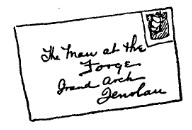
When I saw The Boy, I demanded the money. He produced it without a word, and I slipped it into the envelope. I showed him the letter, and told him to give it to the smith with my compliments. He refused, but was willing to come to a compromise. Eventually, he went, after dark, and put the precious epistle on the forge-bellows. Thank the stars, that is done with!
Bill has tooth-ache, and makes his pains an excuse for declining to have a wash in the creek.
|
A WORD OF LOVE
A word of love from you, my Dear,
And clouded skies are blue.
Since love hath power to cast out fear,
No shadow lingers when I hear
A word of love from you.
The light of your brown eyes could win
A soul from Paradise!
There is no hope of life for sin
Or thought of base descent within
The light of your brown eyes.
My own, from head to feet I love
Your body warm and sweet,
And every darling curve thereof.
Be mine—my Queen all queens above—
My own from head to feet.
|
This morning we made up our minds to leave Jenolan, in spite of the cloudiness of the sky.
I heard, with great satisfaction, that the chemist from Tarana was at the Caves House. This man travels about periodically, and is said to be a dentist of some skill. I consulted him about Bill's jaw, and he consented to glance at it. So I found The Boy and sent him into the house to be examined. He looked as though he almost wished he had had a wash and said nothing about his ache. In a minute or two, I heard a strangled yell, and the patient came out, spitting blood. The tooth had been extracted, and its quondam owner seems pleased. But the chemist was master of the situation, and wrung five shillings from our "shammy." Think of it!
We spent the rest of the morning in exploring various caves and crevices. We clambered about the crags and wormed ourselves into all kinds of wallaby-haunted holes. We ended by visiting the Glass Cave. The adventurer who enters that cave really deserves to find something worth looking at. He crawls along a passage like a wombat burrow for a distance of some yards, and falls into a pit. Then he gathers himself together, and takes a full turn to the left, and squeezes himself up a slippery hard channel, pulling himself laboriously along by means of little stalagmites and other helpful obstructions. He bumps his head, and tears his shirt, and swears, and knocks his kneebones, and barks his shins, and burns his fingers, until he suddenly finds that he has thrust his head sheer over the edge of a precipice; in fact, he is looking into the Glass Cave from a hole in the wall. Below his chin a ladder of wire rope descends into darkness. But he could not even turn over in the narrow sloping passage, and he spends some minutes in wondering how he is to set his feet on the rungs of the ladder. Then he forces himself out into space, keeping hold of the ropes and constantly lowering his grip on them until he is hanging head downward and only his legs are in the hole. Very cautiously he draws out one leg, and then drags himself up the ladder again till he can securely withdraw the other. In triumph he descends the swinging ropes, and finds for his pains much mud and a cell paved with bats' bones. And it is far more difficult to get out of than it is to enter the dismal dungeon.
Soon after dinner-time, a great thunder-storm swept up and burst above our heads. The magnificent echoing roll of the thunder, filling the hollow dome of the Coach-house, crashing with sonorous reverberation from wall to wall, roaring lion-like, growling, and slowly rumbling into silence, was music to fill the heart at once with awe and exultation. When the storm had passed, we left Jenolan by the Tarana Road, a steep zig-zag track cut in the side of a bare grass-sloped mountain. In this district, the mountains of granite and other igneous formations always look rather mangy when compared with the tree-clad hills of sandstone. We had almost reached level ground, when another storm came up. We enveloped our swags with our oil-cloth, and looked for shelter. There was a huge hollow log close to the road. We crept into it, and sat there, nursing our knees and watching the blotting out of the mountain view by falling rain. The shelter was inadequate. Soon, drops of tan-brown water began to filter through the interstices of the charred wood above us. Furthermore, an extremely cold draught blew steadily upon our backs. We preferred the storm, and continued our journey in defiance of weather. At a distance of six miles from Jenolan, we took a bridle-track to the left. Bill thought we were going the wrong way; but I knew that if I missed one place, I should find another. The sky is above us everywhere.
When I struck a made road, I again wended to the left, in spite of expostulations, and was soon rewarded by arriving at a spot where several bramble-knolls stood by the roadside. Each knoll was covered with ripe blackberries. After a meal of berries, we sauntered on until we saw two houses, one on each side of the road. On the right was a squat cottage flanked by a garden; on the left, a slab but in a bare paddock.
"Where have you brought us now?" The Boy complained.
"This," and I smiled reassuringly, "I take to be Gingkin."
"Garn! There's only a house and a half here."
"Yes? Well, the house with the garden is the post-office."
So it was, for a wooden plate on the verandah bore the inscription POST OFFICE in large letters. An old lady was in the garden. Obviously she was the post-mistress. I touched my hat, and asked: "Is this Gingkin Post-office?"
"Yes."
"And do you know where we could find shelter for the night?"
"You might get one if you go on to Hennessy's."
Isn't there any old shed about here?"
"There's the hut opposite, but I don't like to offer it to you. It's a leaky old place, and it wouldn't be comfortable. Are you going to the diggings?"
We have left civilisation behind, thank the gods! I voted for the hut, and we are now occupying half the town of Gingkin. We have a fire in a broad fire-place, and hooks and chains for the suspension of our billies. The old lady sent a boy across, a few minutes ago, with a number of sacks, that we might make a soft bed on the earthen floor. From the bush, close at hand, floats the sweet melancholy note of a mopoke.
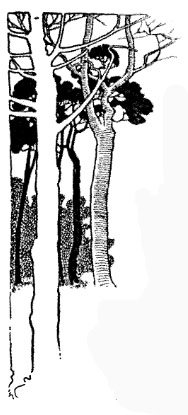 |
FRIENDS OF MINE
Every plant that grows
—Tiny weed or tree—
Every flower that blows,
Hath a word for me.
Sea-weed in the sea,
Swinging in the brine,
Grass-blades on the lea,
Are all friends of mine
Everything that goes
Creeping leisurely;
Everything that knows
Joy of floating free;
Worm and fish and bee,
Bird and child combine,
Bringing jollity;
All are friend of mine.
Clouds of grey or rose,
Gold or ebony;
Stream that flags, or flows
Laughing in her glee;
Wind that none may see
Limbs with me entwine,
—Sweetest lover she!—
All are friends of mine.
ENVOY
Love-knit comrades we
By His will divine,
His who bade us be;
ALL are friends of mine.
|
Following the directions of the postmistress, we passed through "Hennessy's paddock," where we found it necessary to again enquire the way. There were some children in the paddock, fair-haired happy bairns, who fled at our approach. But the eldest, a girl of about eleven years of age, halted when she had placed a fence between herself and us, and answered questions from her point of vantage. We departed, to her evident relief, and followed a good track for a mile or two, passed another house, and came to a little green plain. We wandered from the track, in search of mushrooms, and picked up a clear trail further on. We then took the new path, and religiously traced it along a fence for a considerable distance. But when we came to the corner of the paddock, the track turned with the fence.
"Having come this far," I said, "we may as well inspect the man's fence all round."
"What do you mean?" said Bill.
"That this track runs alongside the fence to the spot where we struck it. When we reach the green flat again, we'll look up the proper way. How about tucker?"
We had our dinner, and solemnly completed the circuit of the selection. We saw several wombat-holes and innumerable wallabies, and eventually we regained the proper track. The diversion was quite unnecessary, and with a little care we should have avoided it. But if we are to be careful we might as well be at home. Besides, we have plenty of time. And then there's Marjorie.
At last we came to a scattered settlement. We looked through the window of the first building we reached, and discovered evidence of our whereabouts. At the other end of the single room were rows of wooden benches. On a table, close to the window through which we were peering, were three brass candle-sticks and some plaster statuettes of Jesus and His Mother. "Most of the people in Shooter's Hill are Catholics," Bill commented. And we went down a well-made road, passed the post-office, and came to a selection in front of which grew a thick blackberry hedge.
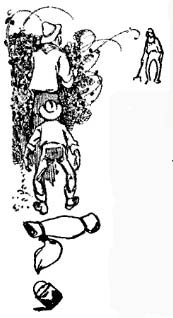
"Armour's!" cried The Boy.
"William Armour, of Shooter's Hill," I agreed.
We got over the slip-rails, and ate ripe fruit on the other side of the hedge. Then Bill Smith said suddenly, awed into a whisper: "They're watching us."
True," I replied, without ceasing to appropriate the thick-blooded berries; "the gentleman with the mattock left off work about three minutes ago to wonder who the deuce we are."
"Well, why don't you leave off bagging his blackberries?"
"I like 'em."
"S'pose he's angry? "
"If he's wrong-headed enough to be annoyed, he won't help us, anyway. So it can't hurt us to eat more of his berries. If he don't mind our taking the berries, we may as well have our fill before we interview him. It's too late to leave off on a supposition."
The boss, a sharp-eyed, pleasant-faced man with a fair beard, waited for our business.
Are you Mr. Armour? "
"That's my name."
"Voss Wiburd said you might be kind enough to direct us on the road to Werong." This, by the way, was true.
"Come inside. I suppose you won't want to go any further to-day? "
"Thanks, no. We'll stay here to-night, if you let us."
He led the way into the kitchen of the slab-built house, and presented us to his wife, a broad-built powerful woman. She set to work immediately to brew some tea.
This is a typical selection, a little farm wrested from the bush by intelligence and muscle. Its proprietor is one of those men who stand unobserved, and sustain our destiny upon their shoulders. They are the foundation-stones of a great nation.
Armour has a family of several children, ranging in age from about eight to about eighteen. As usual, the youngest members of the family won my closest attention, and I made overtures of friendship to the smallest boy and his sister, who was, perhaps, two years his senior. At first they were very shy; peeped at me through the door crack, and hid ostentatiously behind the furniture. When I tried to bring them nearer by pretending to take no interest in their movements, they attracted my attention by whistling on a set of pan-pipes, but still hovered out of reach. At a sudden movement on my part, they scampered. But I was born in Sydney, and I never hurry. In the evening, I sat in the ingle-nook with the bare-footed younglings, and enjoyed myself. The lassie recited, in the sing-song peculiar to public school children, Paterson's false gallop of verses, the ballad of "Lost." It begins:—
"'E oughter be 'ome, said the OLD man, without there's somethin' aMISS. 'E on'y wenter the TWO-mile—'e oughter be back by THIS."
Only the chorus of the infant class can deliver it with full effect.
Generally speaking, it is the easiest thing in the world to win the trust of children. The instinct—the yet unblotted knowledge—of childhood is never at fault. Others may mistake your reserve for self-complacency, your silence for surliness. But the children know. They have not fully learned to misinterpret the word of eternal Love. They face the Light with eyes not yet too thickly veiled. The blindest man on this round world can see the light of Heaven in the eyes of a little child, can feel the breath of God in the warm air that surrounds its sweet-fleshed body. No wonder that modern Art, rebelling against the worship of false gods to which materialistic folly would force her, enthrones in painting, in sculpture and in literature the ideal of childhood, and bows down to it in passionate adoration.
The rugged simplicity of Armour's household appeals strongly to my sense of fitness. Their method of making butter by stirring a bucketful of cream with a stick seems to be absolutely and undeniably right—for them. That they boil great lumps of salt meat and hacked-up pumpkin and Swede turnips in one big black pot is evidence that the complex mischief of civilisation is a thing of naught in this far-away spot. When the contents of that pot are placed, steaming upon a dish, in the centre of the table, where each of those who sit around may reach them with his fork, I remember funereal banquets at which I have been present, and a table at which a waiter knocked me down by thrusting a chair against the back of my knees and thereafter whisked away my dinner while my attention was diverted. We are not over-burdened with ceremony here.
Armour gave us a plan of the more difficult parts of the course before us. Then he said: "Watson, the storekeeper is taking supplies to Werong to-morrow. You'd better go with him and get a lift. I'll see that you start in time." He showed us where we are to sleep, and left us, wishing us a good night's rest. We have a real bed to-night, with blankets, and coverlet, and a straw mattress that rustles when one turns upon it.
The landscape was white with frost when we bade farewell to Armour and walked briskly down the road in search of the store, and the air was cold and exhilarating. We found Watson just preparing for his journey. His wife was helping him to load the dray, and it struck me that all the women about here are of the same type—large, powerful and downright. And most of the children are bright-faced and hearty, with hair half-bleached by the weather. We readily obtained leave to throw our swags upon the laden dray, and at half-past eight we started for Werong. The dray was drawn by three horses, harnessed in tandem fashion. There were no reins, but Watson walked beside his team and directed it with voice and whip.
Mile after mile we strolled along a bush-track which wound among the grey and yellow trunks of straight gums—a monotonous and not very well-marked course. The velocity of the cavalcade was not excessive; the average rate was, possibly, two miles an hour. Bill and I soon discovered that we grew weary in attempting to keep pace with the horses, so we used to walk ahead for about a mile and then wait until the main body reached us. Some four hours after our departure from Shooter's Hill, we crossed a creek. Watson shouted to us, and asked whether we were going to stop for dinner.
"No," I said; "it's not worth while."
"Because that's the only water on the road," he explained.
And we drifted on.
We reached the diggers' settlement of Mount Werong about two hours before dark. It is not a particularly picturesque spot. On each side of a depression, which common speech exaggerates into a gully, are a few huts of stringy-bark, and some skeletons of deserted dwellings from which the bark has been stripped. In the depression is a dam, holding back a sheet of dirty water. On every side are excavations of various size, and heaps of yellow earth. Go straight from the dam in any direction and you will come either to a hole like a clumsily-dug pond or to a little oblong pit like a child's grave.
"Here we are," I said, and pulled my swag off the dray.
"Wed better look for a camp," was The Boy's first idea.
"By-and-bye," I replied. "But I'm hungry now; ain't you? So long, Mr. Watson! Much obliged."
We made a fire in a hole where somebody had been washing dirt in a cradle, and we had very soon satisfied the cravings of the body. Then I lay back on a heap of earth and filled my pipe. The Boy was restless. He said: "We'd better look for a camp now."
Give me a match, O thou of little faith," I drawled sleepily, and thereupon lit my pipe and lay a-smoking. Soon I broke silence: "See those men on the hill trying to make some horses drag a heavy boiler?"
"Yes; I've been watching 'em."
"Want to help 'em?"
"No."
"Well, we won't go near 'em till I've finished my pipe." And I smoked in peace, until I had finished. Then we left our swags, and approached the workers on the hill. A big cunning-eyed hooky-beaked man, thick-bearded and arrogant, was acting as overseer. To him I spoke:
"Good day, boss! Could you tell us where we can camp for the night?"
He eyed me from head to foot, and rasped a churl's reply: "Yes, my son"—he waved his hand comprehensively—"you've got the whole bush to yourself." And he turned away.
"The old curmudgeon!" gasped The Boy.
"Shut up," I muttered, "and wait for our luck."
We stood and watched the shouting men and sweating horses. It was growing dark. Presently a man detached himself from the crowd and came to us.
"I'm sorry I can't offer you a camp in my house," he said apologetically.
"Don't mention it."
"I've got a small house and a large family—a very large family."
Again: "Don't mention it."
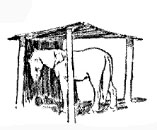
"But if you like to use my stable, you can move the cart out and I'll put the horse somewhere else."
"Thanks."
"That's the place, yonder. You'd better go and get yourselves some wood now. There's going to be a frost "
So we are using Mr. Dawson's stable. It has only one wall (and a bit), but its roof is sound, and we have built a roaring fire in front of it. The proprietor, too, has placed at our disposal a heap of sacks.
The imperturbable Chinaman gains his point by means of two phrases: "No savee!" and "Aw li!" For the rest, he is passive. You may learn something even from a Chinaman.
The night was bitterly cold, but it wore through in reasonable time, and left us sleeping within an inch or two of our bonfire. Three times before dawn I left my blankets and flung logs on the fire, sending fountains of sparks into the freezing moonlight. And on each occasion the night had stolen every vestige of heat from my bed before I could take my place again. She was welcome to her booty, however, for I am no cold-blooded toad, and I never grudge heart's-warmth to a friend.
"Now," I said, as I cast out the tea-leaves, "we go, probably, from here to Vinn's on the Abercrombie. And the way to get there is to 'take no right-hand tracks.' Those are our directions: 'Arma viamque cano.' Roll up and trek."
"How far's Vinn's?" asked The Boy, after trying to make elaborate calculations without any basis.
"Don't know, and don't want to."
"And you don't know the track?"
"Only as much as Armour told us:—
But shall I go mourn for that, my dear!
The pale moon shines by night;
And when I wander here and there,
I then do most go right."
"I reckoned we might get dinner at Vinn's."
"And so we shall, by great Pan's leave. But you are looking too far ahead. Oughtn't to be hungry just after breakfast. Help me to run the cart in again, and then we'll start."
Well, we reached Vinn's in the middle of the day and found Vinn himself standing in front of his house.
"Day!" from us.
A nod from Vinn.
"You Mr. Vinn?"
Another nod.
"We're on the way to Wombeyan, Mr. Vinn. Camped the other night with Armour of Shooter's Hill, and he reckoned you could put us on the track."
"Yes?" said the immovable bushman.
"Yes, and—ah—er—well—here we are."
"I can't go with you, to-day. I've got to go the other way altogether."
"Oh!"
"But there's a young fellow here may be going part of the way this afternoon." And Vinn moved deliberately into the house.
"Dinner?" asked The Boy anxiously.
"Don't prompt Wyrd, Bill. She knows her game."
Vinn came out and thought in the sunlight. Then he spoke, slowly: "No. He won't be going. But you can get along all right. Go through that gate, and turn off, up the range, at the first rise in the track after you pass the house—my old house."
"All right! thanks!"
Obviously our business with Vinn was over. I was about to swing my load into position, when he spoke once more: "Better come in and get some dinner before you go." And we went in, and found the household—consisting mainly of pretty girls—assembled round the table. After a copious meal, we slouched into the sunlight again, and Vinn verified a pencilled plan which Armour had drawn us, and gave us a full and unmistakable explanation of it. Whereupon we took to the track, blessing him.
"I won't prompt Wyrd again, Wilford," said The Boy. "She's all right."
A young kangaroo dog was trotting after us. It was a beautiful animal, but we agreed at once that it must be sent home. Dog-stealing is not one of our practices. At the same time, the dog was an affectionate beast, and it would clearly have been wrong to have resorted to violent language and cruelty. I undertook to dismiss our follower in a rational and kindly manner. When I stopped and turned round, the dog halted and watched me. It was quite ready to listen to argument. "Good old doggie," I said gently, "you must go back." But the animal, after a moment's thought, came to a different decision, and sat down. "See here, boy—here, boy," I expostulated; "if you don't go back, I shall have to punish you." To indicate the form of his prospective punishment, I softly beat my thigh with my hand. The dog came writhing to me, wagging his tail and cringing to the ground. "Well, Bill," I said with a sigh, "we've done our best to send the beast home. I reckon no further responsibility attaches to us." And the dog quietly came after us. One cannot expect to find a highly-developed intelligence in a mere dog; but I could hardly have put the case to him more simply and clearly.
We turned leftwards at the rise, crossed the creek, and followed up the dip in the opposite hill. At first there was no track whatever, but before long we struck an old dray-track. We mounted up and up, until we reached a saddle (or "point"), and then we took to a blazed foot-path which ran to the right along the range. A brown retriever came out of the bush, and showed, by a greeting devoid of impertinent curiosity, that he was a friend of the kangaroo dog. I turned to the latter and explained the situation: "We have already disclaimed responsibility in your case, and, if any acquaintance of yours cares to accompany you, we are quite prepared to do the same on his account." Both dogs listened attentively. "However," I continued, as a collie trotted down the track and carelessly licked the retriever's head, "we don't want to march at the head of a canine army."

When we reached a lonely cottage near a swamp, and made the usual enquiries, we discovered the owner of our followers. An old woman looked at us with piercing suspicion, and said: "Whose dogs are these?" Then she shut her lips and stiffened them against one another.
I twitched at my beard, and answered: "Don't know."
"Where did you first see 'em?"
"Up on the range."
"H'm!"
"Beg pardon?"
"How is it they're with you?"
"Followed us. We couldn't make the brutes leave us. Do you know whose they are?"
"Yes."
"Yours?"
"Yes."
No wonder they came the same way that we did. They were on their way home all the while. But, to my secret satisfaction, the woman had to chain up the kangaroo dog, to prevent its following us when we plunged once more into the bush.
It was getting dark when we clambered, hungry and footsore, down a sharp descent to a broad metalled road.
"Right or left?" from Bill Smith.
"Both. Try left, first."
So we went to the left, about a quarter of a mile. Then we turned back, and went the other way. We found an empty hut and a large creek. We hung about, mooned up and down the track, and grew hungrier.
"I'm hungry," I told Bill, at last.
"I'm tired," Bill said.
"Also," I added, "it's very dark. We'll light a fire on the flat by the creek, have our tea, and—if nothing turns up—camp under those big oaks."
We bathed our feet in the icy water, and then built a fire and boiled rice. About an hour afterwards, an old man rode down to the ford.
Hallo!" I shouted.
He answered gruffly from beneath the folds of a shawl in which the lower part of his face was muffled: "Hallo, mate!"
"D'you know where Mr. Chalker hangs out?"
"Which Chalker? "
"Caretaker of Wombeyan Caves."
"Yes—oh, yes!"
He dismounted, hung his horse to the fence, and sat on his heel by our fire. He was Chalker's brother. We smoked the pipe of peace, and conversed at length. Before he left, he pointed out a bridle-track which led to the Caves House.
It must have been nearly ten o'clock when we dragged our steps across the green flat to the weatherboard one-storied cottage that serves as an Accommodation House at Wombeyan. We flung down our swags on the verandah, and looked through the front windows. Nothing to be seen but the dim squares of sky behind the windows on the other side of the dining-room! We knocked, and the house sounded very hollow. We tramped noisily on the verandah. We beat at the door with the butts of our sheath-knives. We wakened nothing but echoes—echoes that sounded like the footfalls of ghostly adherents of a long-loved domicile. Bill looked pale, so far as I could judge. He sat on the edge of the verandah, and waited while I set out to explore the rear of the building. I saw light streaming from a window. I peered in, and saw that a fire was burning on the kitchen hearth. Without hesitation, I tried the door, and it was not locked. Straightway I returned to The Boy and reported.
He said: "Anybody there?"
"No, not a soul."
"Well!"
"Well?"
"We can't go in."
"Oh, can't we There's a good fire, and a chair each side of it, and a safe that looks as though it might hold something to eat. Come on."
No fear! Not if there's nobody to ask."
"All right. Your teeth are chattering so hard that you bite off the ends of your words; but if you like the cold, you're welcome. Good-night!" And I was walking towards the kitchen, knowing well that he would soon follow.
Suddenly a window was thrown up close to me. I looked hastily round, and made out a female head with window curtains gathered together under the chin—a sort of "Bluebeard's wife" illusion without the red paint. The apparition was ghastly, silent and immovable. It had staring eyes. I spoke to it airily, and it replied in grave long-drawn monosyllable.
"Mr. Chalker live here?"
Yes."
"He's out?"
"Yes."
"In the caves, maybe?"
"Yes."
"Be home later?"
Yes."
"We can go into the kitchen, I suppose?"
"Yes."
"Come on, Bill. You needn't violate your conscience. A kind lady has given us permission to warm ourselves."
While we were sitting by the fire, the door opened, and the apparition walked in, full length. It was Mrs. Chalker, as we soon learned, and a very pleasant apparition, too. She asked us: "Have you had your tea?"
"Yes, thank you," Bill said.
I kicked him furtively, and explained, "But it was very long ago, and we're mighty hungry again now."
She made us a pot of tea, and placed a loaf of bread before us. While she was busy, I quietly murmured to Bill: "If we are supposed to pay well for our board and lodging here, let's be sure of our money's worth. If we are to be let off lightly, anyway, why should we stint ourselves? Tuck in." And he tucked.
We smoked before the fire lazily, with complete satisfaction. When we knocked the ashes from our pipes, Mrs. Chalker offered to show us a bed. She brought us to a room where there are three beds of superior quality, and left us to make our choice. "How good is man's life, the mere living!" Can I blow out the candle from here?
At half-past two this morning, a couple of young men dragged themselves into our room and took to one of the other beds. I awoke, and interviewed them. One was the post-boy from Taralga; the other was the owner of a sheep-run a few miles away, and his name was Robinson. They and another fellow, whose Christian name was Walter, had been assisting Mick Chalker to capture a pig. This pig had been running wild in the bush for upwards of five years, and they had taken another eight or nine hours to drag him from a gully to the top of a hill, where they left him securely bound. He was a very savage pig, they said, and strong, and they were tired. So I allowed them to sleep.
Soon after daybreak, Mick Chalker walked into the room. He said he was going to bring home the pig. Robinson lay still, with humped shoulders, and suspense in every curve of his bedclothes. My feet were sore, being cut by the much-broken uppers of my boots. But we certainly could not afford to lose a chance of paying part of our way without money. So I was cheerful, and chirped out:
"Can we assist you, Mr. Chalker? "
"I'd be glad if you would, and then I won't have to ask this young man," Chalker acknowledged.
And Robinson relaxed with a deep sigh.
We dressed ourselves quickly. I pulled on my boots. Oh, my poor feet! But I swaggered out, as though I were quite at my ease, and before long we were off to the hills. There were four of us—Walter, Mick, Bill and I. Mick led a horse which drew a slide (or sled). A slide consists of a pair of heavy wooden runners, connected by crosspieces and decked with bark. You can drag a vehicle of this kind over country which a cart could not possibly traverse. I mean you can make a horse or a bullock drag it.
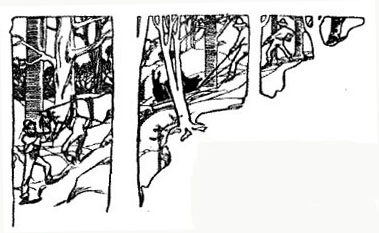
The pig looked almost resigned when we found him. He neither romped nor squealed. He merely heaved his bulk with a few sulky grunts, though his eye was wicked and watchful. We hauled him upon the slide and strapped him down. Then each of us—except Mick, who led the horse—held the end of straps which were attached to his legs, and prevented his rising or rolling. The Boy was on the right, Walter behind, and I on the left. How we swung and bumped and slipped down the hill! We jolted down the rough granite slopes in danger of our lives. The slide shot from side to side, thudding threats of broken legs; or leaped suddenly along on one runner, and attempted to upset the pig upon us. The straps we held were short; mine scarcely extended three inches beyond the edge of the slide. But we hung on as though they were the handles of a battery, and rushed along over rocks and through soft soil. We had to keep an eye upon the pig, and yet we must, at the same time, dodge the slide and avoid obstacles. We had to twist ourselves round or scramble over trees, logs, stumps and boulders. Then we would come to a creek. The slide would splash into the ford, and with it we would go flying knee-deep into cold water. And, all the while, we watched the old porker's tusks, and wondered how soon we should be thrown within their reach.
We reached home in good time for breakfast, had tea and damper, and feasted royally. But the thought of the pig haunted me. I had played a very mean part in his little tragedy. For five years he had been enjoying his freedom, grubbing for roots and munching thistles in the gullies. With magnificent courage, skill and strength, he had held the dingoes at bay, and had asserted his right to range the bush without molestation. And I had tramped all the way from Gladesville to take the part of his oppressors. I had dragged him, ignobly bound, from the scene of his unhampered happiness, and had helped to pen him in a dirty little enclosure. I felt mean. I explained to myself that I had merely saved Robinson a troublesome job, and that the pig would have been put in the sty whether I had helped or not. But sophistry availeth not, and I should not care to meet the eye of my grunting victim.
We spent the greater part of the day with Chalker in the caves. They are better than those at Jenolan, and the gem of them is the Kuringa. As we stood in a dark corner of the Arch, and waited while Mick lit the candles before proceeding to the Old Cave, I saw a small snake crawl from beneath the hollow of Bill Smith's left boot. He was watching Mick. I told him to tread on the snake, but he grew unduly excited, and jumped away. I was about to stamp upon the reptile, when Mick stopped me. He said he had never seen a snake in the caves before, and that he would like to get this one as a specimen. So I held the little creature fast with a stick, while he ran for a bottle. It was a savage snake, surely, biting the ground, and striking at my hands when I tried to place it in the bottle. But we imprisoned it at last, and had a good look at it. It was really very beautiful; about a foot or fifteen inches long; in colour, a rich brown with clear black stripes. This is the first snake we have seen, though everybody warns us that during this month the bush is a-swarm with them, both by day and night. We are told that they will creep into our blankets and pay our fare across the Stygian Creek. Content.
Late in the afternoon, we turned our backs upon Wombeyan, and accompanied Robinson to his hut on the sheep-run. The hut is divided into three rooms—two small sleeping compartments and a living-room. And here we sleep this night. How long will it be before we reach really civilised people, who will refuse to grant us house-room?
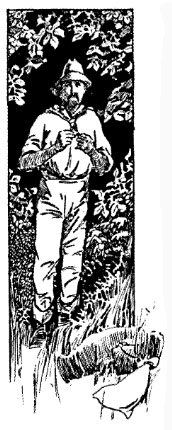 |
OPEN SPEECH Good friend of mine, you feel with me— Your blood grows hot by sympathy With something that I say or do; Then speak—I want a word from you. Let not the silence wrap you round While you are living over-ground. They say that earthly years are few; Then speak—I want a word from you. Perhaps I pass you in the street, And, when our eyes a moment meet, I wonder are you wishing too; Then speak—I want a word from you. Are you, too, longing for a sign, Yet fear to stretch a hand for mine? What other am I writing to? Then speak—I want a word from you. Some way our thoughts together run, Since both lift brow toward the sun Beneath the self-same vault of blue; Then speak—I want a word from you. |
Last night I found myself in a dream of which it would be easy to invent a mystical meaning. I was enveloped in a thick mist—a dull white dark ness. Under foot the ground was like a heavy paste of fog or coagulated cloud. I felt that I was on an errand, but I was lost, and a great dread was upon me. I was tortured by the silence, and yet I could not cry out. Suddenly the mist became luminous, and with a rumble of thunder a star fell from heaven and lit glowing upon the solid cloud at a short distance from me. Then the light that was diffused throughout the vaporous atmosphere gradually concentrated upon the star. The mist shuddered and began to sweep in eddies about the centre of light; the circles in which it whirled grew smaller and closed in, until a dense white mass with a heart of fire spun before me. This by degrees thickened and diminished till it stood like a rosy column. Gradually it took human shape before my eyes, and with a cry of joy I took three steps and clasped the radiant form of Marjorie.
All the morning we loafed in Robinson's hut, and clacked of every conceivable subject. Robinson leads a lonely life here, and is glad of any company—even such as ours. If there had only been a bottle of whisky in the place, what a pleasant evening we might have spent last night. We had a jolly time as it was, with weak tea and damper.
I suppose it must have been three o'clock when we shook hands with our host and took the bridle-track through the hills. This track disappeared, after we had trusted it for about five miles, and left us in a paddock overlooking the Wollondilly River. We knew that a man called Gorman had a selection on the nearer bank of the river, and that a bridle-track went somewhere down a spur to it. We spent three-quarters of an hour trying to find the upper end of the track, but it was time wasted. Far down we could see the stream, curving away among the mountains, but between us and it were cliffs and precipitous slopes.
"We must go down the lower gully," I said, "and then we'll be sure of being below the cocky's place."
"It's pretty rough," Bill murmured, when we stood on the brink.
"Horrible steep!" I admitted.
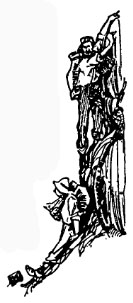
Nothing but a rock wallaby had ever ventured that descent before. It would have been risky enough without our swags. As it was, our blankets hustled us off narrow ledges and forced us to take prodigious leaps at uncertain grass-tufts. When we landed, the swags would swing out with a sudden tug and invite us to swoop headlong into fissures and hollows. Many of the rocks were slimy and afforded us no foothold; others gave way beneath us and bounded over crag-edges, thudding and crashing with suggestive emphasis. Where a little soil had collected at improbable angles, there was no safety, for an unwary projection of weight started avalanches. Our descent was not rapid, but it was engrossing. When we reached a dry creek-bed full of smooth shingle and boulders, we followed it down until we came to the river. And here, on a flat Dantesque with ring-barked trees, we made a discovery. We came across the relics of a house. A couple of corner posts still stood, and a sloping roof had been newly constructed by leaning sheets of bark against the solitary cross-beam. Under shelter of this gunyah were a padlocked box, a straw mattress, and some blankets. Close at hand was a heap of ashes, and on it grew a spreading vine of vegetable marrows.
Now, I was quite willing to try a change of diet. Bill had been enjoying variety, because he eats meat. I touch no flesh of any kind, and had lived entirely upon damper and tea since our arrival at Wombeyan. But it was Bill who suggested that we should borrow the largest marrow.
I reproved him. He is too hasty. I said: "Whoa, there! Honesty is the best policy, Bill. The man would miss that fellow directly he got home, because it grows in the open. Take that one on the right. It's nearly hidden by leaves, and it's not much smaller than the other."
We divided it deftly, that its shape, bulging on our nose-bags, might not betray us.
"Let's clear, Knight," The Boy said, "before the boss gets home."
But we had hardly turned away before we saw a man swimming his horse across the river towards the flat. He had not seen us, and we did not stop to ask him if we were heading towards Gorman's. We followed up the river-bank for about half a mile, and came upon the selection. Gorman was there, and promised to direct us to Bullio in the morning.
"Where are you going to camp to-night?" he said, fearing fires about his homestead.
"Why, we thought you might have a shed."
He reflected, and said, "Yes. You can sleep in there "—pointing to a rough log-house—" but you can't light a fire near it."
That was all right. We had no wish to light a fire within sight of the house. We cooked the marrow among the boulders on the edge of the river; and it filled our larger billy three times. Bill gave out that he had no liking for marrows, so I had to finish the lot by myself.
We went into the log-house darkling, but I found a bit of candle, and with its aid we explored. We are camped in a little bark loft, with a pile of corn-cobs and a number of mice. I rummaged about the place, and came across a couple of horse-rugs and a gorgeous railed blanket; and we are very comfortable.
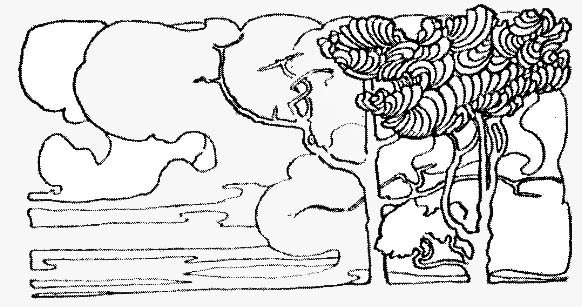 |
LIMITATION
Can a bird's wings fly
This air above?
Beyond the sky
Can a bird's wings fly?
And shall my songs try
To tell my love?
Can a bird's wings fly
This air above?
|
We bathed in a tributary of the river, dressed on the other bank, and toiled up the spur. The track from the Wollondilly to Bullio is faint and confused in parts, but we followed a broad hoof-mark, and arrived at the settlement at dinner-time. From Bullio there is a good buggy road, which is now being shortened and repaired. We passed the road-camp about eight miles back. For the most part the road is unbeautiful, sometimes running for miles by grey ring-barked gums—"the skeleton wraith of a wood."
We are lodged in the playhouse of a public school, and I really think the Government ought to have a better shed erected. It is a miserable bark cubby-house; a disgrace to Rumanwatta—or whatever the name of the place is.
A trav'ler with a collie dog was here when we came up, and we have been sitting over the fire and inventing experiences for each other. The dog only listens and sniffs.
The man indicated his companion. "He don't help me much. People say, 'He looks well fed,' and snap at me for wanting anything to eat. They grudge a fellow a bit of tucker if he don't starve his dog. If the brute's skinny, they look suspicious, and I have to try and look thin myself. Poor people sometimes give me an extra bit for him, though."
We dawdled along the road to-day, aristocratically, conscious of no pressure of hurry and above the plain-featured notion of work. I think this is the way angels spend their time, when they are not running errands or strumming. What pleasure to stretch the arms lazily; to let one's weight sway, with the motion of walking, from hip to hip; to slouch in the sun with half-closed eyes; to breathe! Those were gracious times, of old, when students sauntered over the countryside, and defrayed the expenses of their education by wayside collections freely contributed. There is no money in tramping nowadays.
We turned aside by a track to the right, and The Boy was stung to protest. But the main road leads to Mittagong, as I explained, and therefore our way lay in the direction of a half-right turn. He was dissatisfied. So was I, when our track bore too far southward, but I strode on automatically without change of course or countenance. At an easterly bend, I left Bill sitting on a log, and walked off to a selection for information. I got it from a girl who had brown eyes, light brown hair, and a rather dark, underflushed complexion. I loved her at second-hand for the combination, and for an hour afterwards wished myself nearer home. She said we should have kept to the main road, though we could reach our destination by keeping on as we were going.
"How much longer is this track than the other way?"
She considered before saying: "About three miles; "and her contracted lips raised alluring visions of a distant hill-side. After all, there are ties.
I told Bill that the track was right, and dropped the extra three miles into the slot of silence. For prize, I drew a sudden cheerfulness. He chattered, and I dreamed of beaming eyes, and we descended the slope to Berrima between three and four in the afternoon.
We bought a loaf of bread and a pot of jam, and sat beneath the bridge to make a meal. The public-school pupils are dismissed at 3.30, and above our heads constantly sounded the sweetest of music, the pattering of children's feet. But the pattering of horses' feet we found too violent. At the passage of rider or driver, came dust, fine-trampled wood, and dry chewed hay, showering into our jam. But we ate and laughed, without a thought of budging. And the children left indelible footprints, more lasting even than the indubitate spoor of the god who stamped his toe-marks upon rock as he strode from hill to hill.
Four miles brought us to Moss Vale, a dusty town, inhospitable (track-lore tells us) to trav'lers. A nod and "Good day!" to a horseman produced a stony stare. We have reached civilisation.
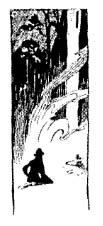
There are sheds at Moss Vale Show Ground, and we intended to scale the fence and find sleeping room under the iron roofs. We hung about the place for half an hour. So did a man with a bridle on his arm, who eyed us from a distance and hovered round with obvious hostility. Perforce, we abandoned our intention, and have settled down under a row of willows near a creek, about a mile and three quarters from the town. We have had to collect fire-wood in the dark, expecting to feel the sticks writhe in our hands. Clouds are speeding across the sky from the south-east with proposals of rain, but we lie at full stretch on either side of our little fire and accept the drowsy moment without questioning.
WE TWO ARE WED
We two are wed, though waiting days
Have not yet joined in one our ways,
But set the darkling wall between
Two hearts that each to each would lean
All night where Love his thirst allays.
Cold Custom's hest our troth obeys,
Because not yet by priestly phrase
Nor to the curious world and keen
We two are wed.
But, Dearest, when your eyes you raise
To mine, I feel around us blaze
The welding fire that flames unseen
And know the miracle has been.
My wife, 'tis God's own voice that says,
We two are wed.
|

The night was kept warm with the clouds as with a blanket, and no rain bespattered our comfort.
While we were at breakfast, three tourists passed, making for the coast. They were English, I suppose, and looked determined—seriously resolved to enjoy their tramp. They were dressed in tweed suits with baggy knickerbockers, and had knapsacks slung across their shoulders. Each to his taste! They were painfully respectable. We thought it a sign of grace that they went afoot, abjuring bicycles.
I went to town in the forenoon, and for comfort's sake I left my boots at camp with The Boy. I was rewarded for my walk by evidence of humanity even in this civilised hole. I was sitting on the station with my back against a wall, when a man—soft felt hat, beard a sable silvered, grey suit—approached, and diffidently invited confidence. He had been watching me furtively for some time, his charity at war with fear of offending.
"Excuse me," he began, "but is it a habit of yours to go without boots "
"Oh no! I'm giving my feet a rest."
"But you have boots?—Excuse my pushing myself into your notice, you know, but I—well, I thought I might be able to assist you—in some way."
"That's all right. I'm much obliged."
"If you haven't any boots, I could find you some."
"Thanks, I have a pair planted in the bush. They chafed my feet, and I'm having a holiday."
"Are you looking for work? If you are—"
"No. I have a job waiting for me further along. I'm trav'lin' Shoalhaven way. Thanks all the same." And I shook hands with him before turning campward.
A hundred yards in front of me walked two fashionably-dressed men, with upturned trousers and broad-crooked sticks. An old swagman, who was crouching woefully by the roadside, glanced hopelessly at them, and clawed his beard in meditation. The sight of my rags gave him a shock of life. He sang out:
"Can yer give us a fill, mate?"
And I parted my plug, and thought.
On my way I bought a bottle of beer, which I subsequently deposited in the creek to cool. When I pulled it out at tea-time, it was covered with leechlike parasites.
The little wretches were evidently sucking their hardest, but the bottle held out; though every moment I expected to hear a slight pop, and to see a sudden distention of a leech. How on earth did they discover the virtue of beer?
Just after I had reached the willows and had stretched myself on the broad of my back to watch the sunlight in the foliage, The Boy asked me whether I had brought any sugar from the town.
"Forgot," I explained. I thrust my hand into my tangle of hidden treasures and pulled out the grime-crusted bag. It still contained about three spoonfuls of damp sugar, so I emptied it over the creek.
"Goin' to buy some?" The Boy enquired.
"And walk into town for it? Thanks!"
"Well, I ain't," he snorted, as I walked off.
I went to an ivy-covered house a couple of hundred yards away, and stood near the kitchen door.
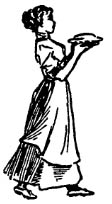
In a few moments a serving-wench came out with a pie in her hands and crossed the yard. She entered the main building, and I still waited. Then she came back, without the pie, and looking at me with a disdainful expression, asked me what I wanted.
"I want some sugar, please," I replied.
"Well, you won't get it," she told me; and she re-entered the kitchen.
Still I waited. Then, as she hurried across the yard with two vegetable-dishes, she went on: "So you'd better clear outer this." But I treated the advice with blank indifference. She passed and repassed, empurpled by strangling rage. At last I noticed a flash of vindictive triumph in her eyes as she sailed across, and I wondered whom I should have to deal with now. A grey-haired old lady appeared at the back-door. I took off my hat and smiled.
"Do you want anything?" the Mistress asked pleasantly.
"Well, mum, I do," was my diffident reply, "but not if it will be any trouble to you. I thought you mightn't mind letting me have a spoonful of sugar."
"Yes, I can give you a little," she nodded, "but only a very little. So many of you tramps come here."
"I want just enough for a pannikin of tea."
"Very well. Come with me into the kitchen."
The silent fury of the maid! The old lady opened a huge canister, and asked: "Have you anything to put it in?"
I produced the bag.
"Oh!" she cried, "Isn't it rather dirty?"
"On the outside. The sugar makes it sticky, mum. But it's clean enough inside. Do to take a few grains of sugar as far as the creek, anyway."
"Hold it open, then, while I spoon the sugar in...Are you travelling? Tell me when you have enough."
"I am, mum."
"Have you come far?"
"Well, I've done pretty well, mum. But I haven't had a job since I started from Sydney. There's something wrong in the way this country's governed. These are hard times for a poor man, mum—very hard times for a poor man." And I absently watched her transferring sugar with a teaspoon, and wished she had chosen a larger instrument.
"Times are hard indeed; I feel it myself. Have you a trade?"
"Yes, mum, I'm a house-painter." I spoke pathetically and tried to look as though my thoughts were far away. But I could feel the bag growing heavier.
"Are you, indeed? And are you a good worker?"
"Well, I ought to be. I painted for Skinner and Giles for five years, and they never complained." I had never heard of Skinner and Giles before. They were merely an inspiration.
"I'm glad of that. I have a job of painting, if you'd care to do it."
"With pleasure, mum. What is it?"
"The partition at the end of the verandah, there. I'm thinking of having that done. How much would you charge?"
It was a question I had not anticipated. I knew nothing of the cost of painting, and an estimate from me would probably create amazement. My hope lay in dodging particulars. I replied with reverent melancholy: "In times like these, a man must take what he can get, mum. I'm quite ready to suit my prices to the purses of customers. You were saying, mum, you felt the hard times. Now, if you'll just make me an offer I dare say we won't quarrel about it."
She was silent, and I supposed she was making calculations. But at last she said with deep regret in her voice: "I'm afraid I'd better not have it done, after all. I really can't afford it."
"Very well, mum, I know how it is—. Why! I beg your pardon, mum. You've gone and filled the bag up to the top. I should have noticed. Well, now, I am sorry; and I only wanted about a spoonful, too. And now what am I to do? I don't like to empty it back into the tin out of this filthy old bag."
"No, no," she cried hastily; "you'd better keep it now you've got it, I suppose."

"Thanks, mum, for your kindness. Good-bye. And don't bother about that job, mum; I can worry along all right. Thanks, all the same. Good-bye, mum." And I bowed myself out, nursing my booty, and returned to the willows to lie on my back and study the sun-glitter.
The willow canopy again, tonight: to-morrow, the track. We smoke voluminously in loaded silence. Be Raleigh's colonists held ever in grateful remembrance!
NOCTURNE
Day's bright bird to the westward hovers,
Wings outspread
Golden-feathered and green and red,
Singing the song that is loved of lovers;
Soft and long
Is the evensong;
Hope and peace in its notes are shed.
Way-worn searchers and weary cravers
Smile and sigh,
Knowing that health and content are nigh.
Dreamily drifting, the night-wind wavers,
Whispers and croons,
And sways and swoons,
Wakes and pauses and wanders by.
Comes the season of sleep that blesses
Weary sight
Tired of staring against the light.
Now we long for the calm caresses,
Tender and strong,
And sweet as song,
The cool embraces of healing Night.
|
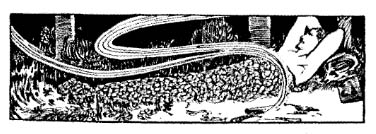
We halted at the Fitzroy Falls for refreshment, within sound of both upper prattle and roar of the depths. A picnic party, which had passed us earlier in a coach, had just finished a royal lunch, and was collecting plates and sorting into pairs. None of the company looked twice at the two dusty tramps; none offered them the broken remnants of a pie or a cake half-eaten. I lingered, hopeful of charity, not because I was hungry, but to give the picnickers full opportunity to prove their deserving of pastry. They did not even ask what we were looking at.
For miles we trudged along a straight flat road, flanked by bush. Then the track took a dip, and ran down a gully at a gentle slope, crossing the creek at times. The vegetation grew slightly richer as we proceeded. We still had a couple of hours of daylight, when The Boy pointed up the hill-side across the creek and spoke of a possible cave. We explored, and found a fine roomy apartment, with a flat sandy floor. The slope in front was strewn with dead wood; and the clear creek below hurried along, bubbling with merry secrets.
"But it's jolly early to be camping," The Boy murmured.
"Rest, rest, perturbed spirit!" I replied, and dropped my load on the sand.
C'EST MOI
A loafer, lying where the grass is deep,
I listen to the warm air softly sighing
In sympathy at seeing half asleep
A loafer lying.
A swarm of insects crowd about me, crying
Faint mating-cries, or clicking as they leap
From tuft to tuft, or flashing gauze in flying.
I murmur: I hate you, imps that flit or creep,
Born for an hour for the mere sake of dying;
Have you no message fit to catch and keep?—
"A loafer—lying!"
|
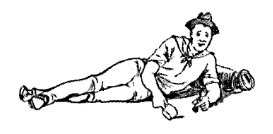
We had breakfast fairly early, and a few minutes later were overlooking Kangaroo Valley. The valley was brimming with dense mist, a lake of white vapour, which began, as we watched, to grow tenuous along the wooded shores, and to creep up among the trees. The sun silvered the surface of the cloud, and drew it up into hillocks, as we descended the pass. The zig-zag track is bounded by a semi-tropical jungle of cabbage-palms, musk-trees, myrtles, tamarinds, tree-nettles, wild gooseberries, and innumerable plant-forms which I love without labelling. In forks of great trees perched staghorn and bird's-nest ferns, and the whole mass of vegetation was knitted solidly together with raspberries, lianas and bush-lawyers. Through the deep shadows shot and floated the notes of coach-whip bird and thrush.
Later, we came upon bush of a more familiar appearance, where there were few trees but gums; the ground was shaggy with the palm-like zamia. Lower still were paddocks, imperfectly cleared, with corn and sorghum growing among the stumps. At last we reached the valley and fine pastoral country. The mist had lifted, and the sun was bright between lazy-pacing clouds.
We held a bivouac in the township, smoked, and bought stores. I visited a baker and asked him whether he would break the Sabbath by selling me a loaf. He looked sharply at me, and answered: "No. But I'll give you one."
"All right," I said, and dropped threepence halfpenny back into the 'shammy.'
He gave me a long tinned loaf, and, when I thanked him, said: "Needn't thank me. The baking went wrong. If the loaf was good, you wouldn't get it. I have a whole batch to get rid of some way."
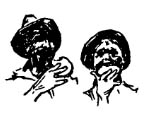
But Bill and I found no fault in the bread.
We turned at the Berry Road, and were soon ascending The Mountain by a zig-zag road somewhat resembling that by which we had made our way into the valley. Among trees of which I took particular notice was one which bore small hairy figs, sweet but otherwise tasteless. Bill suspected that they were poisonous, and would not raise one to his lips until he had seen me eat a dozen. The air was full of rich perfume from the thick brushwood. The road's ascent is gentle, and by no means unpleasant to the pedestrian, though I am told that people who dwell hereabouts look on it as something to be shuddered at.
On the top of The Mountain we unrolled our swags beside a crystal crayfish-haunted stream, which ran across the road in a shallow channel about ten feet in breadth. After tea, we lit our pipes, and talked in a desultory fashion about the future of the Australian race. We had just agreed that, whatever our faults might be, Australians would never develop into an arrogant nation of truculent hypocrites like the English, when two men drove down to the ford in a trap. Their horse was startled by the glimmer of our watchfire, brokenly reflected in the water, and suddenly shied, refusing to make the passage. A voice, which nobody could mistake for that of an Australian, was heard uttering vain expostulations and words of soothing affection. I proffered advice and assistance, explained the nature of the road, and quieted the frightened horse. Then I led the beast across, wading in cold water, and wondering whether I should get a shilling for the job—or more. The night was dark, and the zig-zag road unfenced; but they were anxious to reach Kangaroo Valley, and received my information with the coolness of omniscient ignorance. One of them asked what we were doing.
I said: "Trav'lin'"; and thought I scented coin.
"Oh?" said the questioner, quite at a loss.
His companion came to his rescue. "Oh yes! Yes, of course—selling things. What do you sell?"
"Nothing," I replied.
"Oh, nothing!" echoed the strangers in a tone expressive of enlightenment. And away rattled the trap.
"What did they mean by 'selling'?" The Boy asked, as I took off my wet trousers and spread them to the blaze.
"Commercials," I said. "They were Britishers."
In the night a violent wind sprang up, and blustered for nearly an hour. I awoke, thought I smelt singeing blankets, slapped my bed at random, and went to sleep again. The morning revealed havoc. A spark from the whipped fire had reached our pile of stores, and had smouldered and spread. We had lost a pound of tea, several tucker-bags, some pease, a handkerchief, and a shoulder-strap.
A workman from a road camp, a mile ahead, came along with a halter in his hand, looking for a runaway horse. I had heard a horse pass in the night, and told him so. He was Australian and poor, and was grateful even for an almost valueless scrap of information.
"D'yer smoke?" he asked.
I nodded.
"Catch," he said, and threw me half a cake of tobacco.
The spirit of comradeship lies full length on our continent, a sleeping giant. When he is wakened, he will be recognised by those who wrong us as a formidable adversary. In him rests our strength. Even the worn-out tradition of hostility between Sydney and Melbourne is treated as a preposterous joke by all but fools and foreigners who bray of border hatred and bid the friends pelt each other from the Murray banks. Australia has only one heart.
From the eastern edges of The Mountain, we overlooked miles upon miles of coast and sea, with the distant headlands fading into sunny haze, and the Shoalhaven district mapped out below us. Nevertheless, we did not stop long to gaze, but descended to the 'town' of Berry. Berry is an uninviting flat huddle of houses, with no redeeming points. We hurried through the dreary village with no loss of time, determined to camp in Gerringong, which is the prettiest township on the coast.
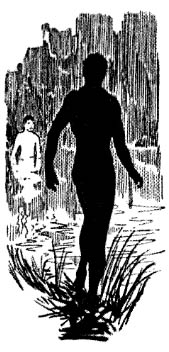
A dip in a willow-shaded creek preceded dinner. A prolonged siesta followed. Bill was footsore, and the metalled roads were no improvement, in his eyes, upon earthen tracks. For various reasons we made our way over the hills very slowly, and night overtook us before we reached Gerringong. Luckily I knew good quarters, for I had camped here before. On the slope above a long pale brown beach stand two empty houses. One of them is the regular stopping-place for tramps and bummers. We stumbled through a rough paddock, amazing cows and execrating the pitchiness of the night, and reached the house. We unloaded with great relief.
"I'll get water," I said, "while you get wood."
So Bill sank into the darkness, and I groped my way down to the cow-trampled swamp which lay between us and the beach.
On my way back, I met The Boy, and asked if he had gathered any wood.
"Two pieces," he answered wearily.
"Bill Smith," I said, after examination of his find, "you're making a mistake. We don't want toothpicks till after tea."
"Can't find any more."
"Take the water to the house, and I'll look around."
Far away to the left lay a clump of bush, as I knew, and I worked towards it painfully. I tore my clothes on a barbed-wire fence and plunged into the swamp, but I reached the bush. Somebody had been there before me, for I could hardly find a stick. While I was crawling about and raking with my fingers, I heard a whistle. It was from The Boy. I whistled back, and he sang out:
"How did you get there? "
"Walked."
I heard him talking to himself, and then there was a splash and the sound of suction as he pulled his leg out of a mud-hole.
"This isn't the way," he told me.
I did not think it was.
He made a few more trials, and finally stood beside me. Together we collected a few sticks, and then gave up in disgust. On the return journey, we went a short distance inland to avoid the swamp, and found a deserted picnic-fire with its heart still glowing, and beside it a noble heap of wood. We took as much as we could carry, and a few minutes afterwards the flames were roaring up our chimney.
We intend to sleep to-night on the verandah which fronts the ocean. The music of the waves is in our ears—
The various rush, in front; behind, the roar Continual, changeless, never less or more, The great sea's mystic song and magic spell, Whose meaning man may feel, but none may tell.
We saw day break upon the sea. Very slowly the tender regretful Eos drew aside with rosy fingers the diaphanous many-dyed curtains that Apollo the Magnificent might step from the gilded portals of the East. In fact, dawn was followed by sunrise. The sight was worthy of being left undescribed by a master of word painting.
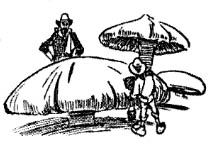
Instead of going back to the road, we proceeded along the shore for a little distance, dodging sly waves on the beaches, collecting shells, and looking for echidnae and anemones in the crevices of the rocks. When we came to a naturally hollowed tank, we bathed. The water was so clear that, sitting quietly at the bottom, we could see the tiny fish, which swam round us in wonder at the harmless monsters of the air and, at our slightest movement, darted off and were lost in the marvellous blending of colors which represented rocks, weeds and pebbles. But mortal men cannot live long in the fairy world; it can never become stale; Science herself cannot destroy its mystery.
Between the sea and the railway, we found mushrooms so gigantic that they incurred suspicion. I took one which measured about nine inches from side to side, and suggested that we should have it for dinner.
"Might be poisonous," Bill objected.
"Might," I agreed.
I found a smaller fungus of similar shape and appearance, and ate it as a test. The agreement was that, if I died, the large mushroom was to be thrown away. I have not died, and we have shared the suspected umbrella and found it coarse.
We had dinner near an old mill, not far from Kiama. As we were talking, a cricket, lurking beneath dry leaves, joined in with sudden trills.
"Little beast!" ejaculated The Boy, and stamped at the spot from which he thought the music came.
"Stop," I cried. "Don't kill it."
"Why not."
"Stupidity and strength don't tot up to right."
He stamped again, and when I checked his gymnastics, said: "Do you know what these things do?"
"Don't want to."
"They eat cabbages. Chew all round the stalk."
"Well?"
"They won't eat the whole cabbage," he complained angrily.
"Have you seen a cabbage in this district? When did you last set eyes on cabbages?"
"Dunno. No more do you."
"I do. We passed a cartload at Moss Vale, and haven't seen a trace of one since."
"Don't care. They do lots o' mischief in our garden."
"If you stamp round any more you can go your own gait home. I'll take another track. Do you think I want my course through the country dotted out in dead things? Don't be a damned fool.
And that is the nearest approach to a serious quarrel that The Boy and I have made. But I have never come so near with any other mate. He is young, and has hardly begun to learn that he is not an alien individual backed by living tapestry. Probably he has much to urge against me, but, you see, I am writing this diary.
Of course we visited the famous Kiama Blow-hole, where
"underground there rolls s sound
From where the prisoned waters glide."
But an intense calm drowsed on sea and land, and no fountain of spray shot into the air. Only, in the tunnel, the surly waters, withheld from play, growled discontent and gurgled submission. I had often seen the Blow-hole before, but it was new to The Boy, and he was disappointed.
Towards evening, the thought of camping arose.
"But where?" asked Bill.
"There's a flea-hopping camp, a couple of miles on."
"Oh Lord!"
"We'll have tea first, and think about camp after."
"Tea?—Where? There's no firewood about this place."
Come on."
I knocked at the door of a cottage, for I am not unknown in Kiama. A gentleman came to the door, and glared enquiringly, suspicious of beggary. I nodded, with confidence of friendship, and said: "I suppose you don't recognise me in this rig, Mr. O'Keefe?" The supposition hit the clout, for he stared with knitted brows. When I laughed, his face lightened.
"Mr. Wilford!" he let out. "No, I should never have known you. But your voice—I never forget voices."
He asked us in, ragamuffins as we were, introduced us to his wife, and invited us to join them at the tea-table. The Boy's sidelong shuffiings and his alacrity in accepting a chair were due less to shyness and fatigue than to a painful consciousness of a breach of decency in his attire. O'Keefe, with painful courtesy, failed to notice the rent an envious stalagmite had made. I am his, heart and hand. May his stars be polished by God's most industrious angels!
At about nine o'clock we sallied forth once more. There was an empty passenger train standing near the goods-shed, waiting for the morning. "We must leave early, Bill," I said, as we climbed into a first-class compartment.
Northward we passed, skirting the Minna-Murra River, crossing the bridge, and then following the railway until we came to Shell Harbour platform, where we turned seaward to visit the township which gives the station its name. Refreshed with deep draughts of ozone and beer, we turned inland again towards Albion Park. We left the road, followed up a little creek to the right, in search of clean water, and came to a halt for lunch beside a green-mantled pool which was only moderately befouled by cattle. We threw ourselves into the long dry grass, and munched the bread we had bought at Shell Harbour.
I was lifting the billy from the fire when a jew-lizard came rushing down the hill towards me, and stopped close to my foot. He came from a little thicket, some twenty or thirty feet away, and ran—as jew-lizards always do when they are in a great hurry—on his hind legs. His eyes were round, and his flanks throbbed.
"Hokey!" I exclaimed. "Just look what a fright this lizard's in. Must be a snake in that clump."
The Boy rose hastily from his nest in the grass, while I went to the thicket and saw the end of a shiny monster gliding away among the leaves. We bombarded the thicket with boulders, hurled with Cyclops force. The snake stole away on the other side of the shelter, and I found him with his head hidden under a tiny bush. A stone, badly aimed, struck but did not disable him, and he shot, with head erect, into a brake where he was safe. He was fully six feet long, glossy black, with large convex scales.
"How about dotting your course?" The Boy queried.
I ignored him.
Between Albion Park and Dapto we were overtaken by a lady and gentleman in a sort of waggonette—a shallow vehicle adorned with the name of somebody's sewing machine. They pulled up close to us, and the gentleman hailed us. We waited.
"I hope you won't mind my suggesting it," he said politely, but we have a few sandwiches, and we thought you might not mind taking them."
"Much obliged, I'm sure," I said; "we'd be very glad o' them."
He groped under the seat and brought out a brown paper parcel, which he surveyed with some dismay. His apologies were ample: "I'm very sorry," he said, "but I find there are fewer sandwiches than I thought; in fact, there are only two. But if you don't mind—"
"Don't mention it. One apiece is good enough. G'day!"
He handed me a couple of ham sandwiches, which I bestowed upon Bill with my blessing as soon as the donor was out of sight.
At nightfall we reached the crossing at Mullet Creek and found five workers—who were making for Albion Park—camped under the willows. We made use of their fire to boil our soup. These minor pre-ordained conveniences you will recognise as characteristic of our tour. They are the direct result of friendship with the pagan gods, Hellenic and Teutonic. Moreover, I have a special protector, for like a well-known freeman, I was littered under Mercury—witness my empty purse and my love of wandering.
A wild wind sprang up in the south and hurled itself upon us, scattering the embers of the fire, and lashing the willows. Clouds rushed up and flung showers of rain as they passed, murmuring, fearful of being late at some elemental celebration, anxious to exhibit their ghastly power. The five navvies rolled their swags and fled towards the nearest hotel. The Boy and I took refuge under the bridge. The atmospheric disturbance grew more pronounced. Out at sea, a tempest was executing its frenzied dance. We could see the flashes of lightning; could hear the rumbling of thunder. From more than one quarter, as it seemed to us, huge bodies of cloud fled towards the centre of turmoil, like regiments of artillery hurrying into action. And we sat on our swags and waited till the stinging showers had ceased. Then we returned to the willows and made up the fire with wood which the navvies had painfully collected. The wind is busily removing all traces of rain.
A ROUNDEL OF NATURE'S EAGERNESS
Your keen desire shakes through the sky,
And sweeps the forest as a lyre;
It thrills the world to melody—
Your keen desire.
The flood of passion waxes higher,
And, quivering, pours its deluge by
In sheets of elemental fire.
To what veiled Beauty would you fly,
To what delight would you aspire,
Glad Powers, and what may satisfy
Your keen desire?
|
Beside the road, half a mile to the south of Wollongong, rested three miners in various stages of intoxication. One lay on his face in the grass. Of the other two, who sat with their feet in the gutter, one imagined himself almost sober, and the other was admittedly drunk and frankly self-depreciatory.
"Come on," shouted the Self-depreciator to us. "Chuck off yer swags, mates, 'n' 'ave a drink."
"Yesh," corroborated the Sober One, "cumanaverdrink—uhrp—lotshere."
"There ain't," growled the man in the grass.
But the Sober One held out a soda-water bottle full of rum, and smiled invitation; whereat I swigged gravely, and returned the bottle that he might pledge me.
"There's no sush crimson fools in th' worl' as miners," explained the Self-depreciator. "Look 'ere!" He thrust his hat back, and slapped his retreating forehead for confirmation.
"They're mostly real good fellows," I said.
"Thasho," the Sober One said with sapient nod, "but he's awri', though he is drunk."
"No, he ain't," from the man in the grass.
"Will yer come 'th us fer th' night?" invited the Self-depreciator. "Our comp'ny ain't mush, but we've gollotser tucker."
"Goin' stinkin'," the man in the grass commented.
"Not too shtinkin'," the Sober One assured us.
The man in the grass raised a fresh point. "Too far."
"Yesh; too far, mi' be," said the Sober One. "We live up on slopesher Moun' Kemler." An explanatory wave of the hand almost upset him.
We regretted that the slopes of Mount Kembla were too distant from our track, but expressed gratitude for the hospitable offer.
The Sober One then gave us some parting advice. "If yer look'n' fur work at th' mines—"
"We ain't," I interrupted.
"No—well, no!" he said thoughtfully. After a moment's pause a bright idea struck him, and he continued cheerfully: "But I shay if y'are—if y'are—be careful even if yer know all—uhrp—'bout it. If yer don't—"
"We ain't looking for work."
"No. I'm tell'n' yer, cosh I'm sobresh o' th' three."
"Shut up," snarled the man in the grass.
The Sober One smiled benignantly at the prostrate figure, winked heavily at us, and kept on: "If yer don't know 'nything, don't—uhrp—don't take it."
The advice was sound, no doubt. He was adding to it when we passed out of hearing.
I am writing this at Woonona, in a patch of bush where I, perhaps, am a trespasser. At any rate, nailed to the tree against which I am leaning is a notice-board bearing the words: Miners' Pathway an Sufferance. But a trav'ler must camp somewhere.
The stars remind me of Marjorie's eyes, and I almost feel as though she were looking at me—not reproachfully, but with a generous love which knows nothing of such nice particulars as resentment or forgiveness. And the breath of the evening is like her presence, surrounding me with subtle deliciousness which none of the five senses can perceive. Since I left her, my love has been glowing by reflection from everything I see, or feel, or hear, and the whole world is a glass to my delight. Nature offers me compensation for the absence of my dear one. My passion is recorded in a thousand beautiful forms. I see it in the green crops which bow to the glad breeze; the wind scribbles it across the water; it flares in the sunset, and glitters on the sea-track of molten gold at sunrise; the wagtails chatter it, and the leaves tell it in whispers; I feel it in the soft, strong grasp of the ocean, in the warmth of sunshine, and in the swing and resistance of branches pushed aside. I believe the birds are happier when I pass through the groves where they flute to their chosen companions.
The beauty of the coastal scenery has been bedimmed all day with a thick haze, caused probably by smoke from bush fires. But the subdued colouring and uncertainty of outline in the landslip harmonised with our almost sleepy satisfaction as we drifted onward. We halted occasionally for a meal, a bath, or a smoke, but we seldom spoke. The silence was luxurious.
Below the crumbling cliffs at Clifton I picked up a pin and stuck it in my waistband—I was not wearing a coat—with prevision of future uses. The Boy said: "Picking up a pin means you'll have good luck."
"Then you ought to be pleased," I said. "We share our luck pretty equally, I think."
But, while looking out a good camping-ground at Stanwell Park, I found a bed—a couple of sacks on a frame-work of saplings. The Boy said, with gloomy triumph: "I told you so," and saw the hand of Providence. I rigged the bunk on a couple of logs, and find it very comfortable.
BENEATH THE TREES
Abysmal ease received us both,
The Boy and me beneath the trees—
An unimaginable sloth,
Abysmal ease.
The rush of water, hum of bees,
And air to slumber nothing loth,
Made silence quick with mysteries.
To Nature we had sworn our troth,
And whoso to her bosom flees
Is given, till he break his oath,
Abysmal ease.
|
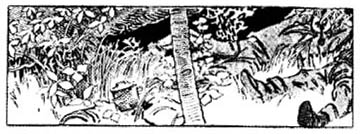
We had hardly slipped between our blankets, when a wind of terrific violence swept, down upon us, and the bush was full of mingled sounds of strife, the lashing of leafy boughs, groaning of tortured trees, and the rending and crashing of branches torn from the trunk and hurled to the ground. Then rain came pelting through the bush. I spread my oilcloth over the top of my bed, and lay listening to the storm and the tattoo of rain-drops. Bill had no means of protection, and was jealous.
He said: "It doesn't cover up the end of the bed."
I grunted.
He said: "The rain will get in and run under you."
"My troubles!" I said. "I'll sleep here, if the bed turns into a trough."
He rolled up his swag to keep his blankets dry, dressed himself, and sat by the fire. The warmth sent him to sleep; and he awoke towards morning, steaming. I believe he was sorry I had not got wet, but the rain had not lasted long, and I had warded it off without difficulty.
The wind still held its course, but we bathed in the lagoon, and defied low temperature and stinging volleys of sand, for at this point we were to bid farewell to the sea. The low-lying strip of land ends at Stanwell Park, for the coastal range of hills curves in and runs sheer down to the ocean.
We passed through Otford, a mining township, and followed the railway to Helensburgh, where we had dinner. The sand flew over us in clouds, and our food was gritty with it, but we cheerfully bent to the will of the gods, and enjoyed ourselves.
We tried a short cut later on, but it took us away in a semi-circle until we were walking southwards and about three miles from the road.
We turned from the misleading dray-track, and plunged into a gully. Slowly we made our way through thick undergrowth and deep beds of rotting vegetation. We crossed the creek, and began climbing the opposite hill. An unused foot-path, which ran parallel with the stream, we disregarded, and waded on until we reached an irregular terrace of rocks, which we skirted, looking for a convenient pass. The Boy was in front, when I heard him cry in a hoarse whisper: "God! Knight, look at this!" And I looked. We were opposite a little cave, about five feet high and four deep. And there, with her back against the wall, as though she were resting, sat an old lady in a seedy black dress. Her draggled bonnet was hanging rakishly on the side of her head, and her long-dead face, with its brown and broken shreds of mummied flesh, glared at us with empty eye-sockets and grinned with a lipless mouth. Her right hand was mouldering into the sand at her side; her left lay on her lap, and I saw on the grisly fingers several rings. And one of the rings was a plain golden circlet. As I stood gazing at this grey-haired Queen of Solitude I thought of Marjorie, and felt myself clutched and held prisoner by unreasoning fear. I longed for my dear girl with fierce and frantic desire. My flesh crept and shuddered, and I felt my muscles twitching. My breath clicked in my throat. The Boy recalled me to my senses.
"What are we to do now?" he asked, as though somebody had injured him.
"Marry, well remembered! We must get along to some place where we can make a decent camp. This gully is too snaky-looking, and we'd be too likely to start a bush-fire."
But about that?" he said, pointing.
"Too heavy, with the swag, for me," I said; "I'll leave it, I think."
He laughed aloud. Then his ghastly merriment infected me and the gully rang. We left off suddenly, and the silence leaped stealthily back. It was horrible. Again Bill spoke:
"I suppose we must tell the police, though."
But I turned away without speaking and made my way up the slope. The scrub grew less dense, and in a few minutes we came to a bush track leading, approximately, in the direction in which we wished to go, and finally we came upon the railway close to Waterfall.
We have camped near the ruins of a humpy between Waterfall and Heathcote. Little is left of the hut besides a brick-built chimney, and of the bricks we have constructed a neat breakwind and a broad fireplace. If a fire were allowed to have its own way in this thick low scrub, the National Park would be swept by the flames in a few hours, for the wind has not yet died away.
Shall I be sorry or glad when I reach home? I have been enjoying my liberty so much, and yet—. I believe, after all, it depends on the light in one pair of brown eyes. God bless them!
We must be very improvident! How came it otherwise that for breakfast we had only a few grains of rice, which we solemnly seethed in the bottom of a pannikin? However, we ate our meal slowly in Barmecide spoonfuls, and started, with tightened girdle-straps through a barren stretch of country, a dry gravelly waste where nothing can grow but stunted scrub and a few gnarled and dwarfish gums.
At Sutherland we were attracted by an inscription upon the front of a house: SUTHERLAND BAKERY AND BUTCHER. We went to the rear of the shop, entered the yard, and interviewed a woman who was standing on a verandah. Several children were playing in the yard.
"Could you sell us a loaf of bread?"
"I'm sorry, but we have none left."
"Yes, mother," a little boy said, "there's one loaf in the bread-box."
"Is there?" said the woman, "Wait a bit, and I'll see."
She went into the house, and returned with a loaf.
"It's stale," she said.
"No matter."
When I produced the 'shammy' she waved it aside, saying she would not charge us anything for stale bread, and I did not press her to violate her conscience. We retired to the shade of a giant gum-tree, about a hundred yards from the bakery, and there we devoured our dry bread with great relish. While we were thus employed, a little girl came to us with a newspaper parcel. "Mother thought you might like a bit of meat," she said, and handed us the parcel, which contained about two pounds of cold roast beef. The baker's family had been watching us from the window. The kindly man, says philology, is the natural man. On the track, we cannot materially affect a man's fortunes for good or evil. Therefore, he appears to us as he is; he displays his real nature; he is kindly.

We walked along the line until we reached Como, where the railway bridge spans George's River. We crossed unobserved, and threw a stone at the notice which threatens foot-passengers with a fine of "not more than twenty pounds." At Tempe we were overtaken by a trap containing a family—father, mother, little girl and two boys. The gentleman, who was driving, drew up and offered us a lift. We jumped up, and were carried briskly on through the gathering shades of night, over Cook's River and right into Newtown.
The lady, who had prompted her husband to pick us up, said: "I saw you in Hurstville, from the verandah of an hotel."
"Thanks for remembering us," I said; "we are grateful."
We alighted at the Newtown railway-bridge. A man was standing on the pavement, leaning against a post. I addressed him: "Any trams going out Marrickville way?"
"I think so. Goin' down the coast?"
"No. Just come from there."
"Did you come through—? What's the name o' that stinkin' little town the other side o' Kiama?"
"Gerringong!"
"That's it. Come through there?" I was down that way, Christmas time. Stopped in that old house above the beach—know it?"
"We stopped there."
"There was a poor old devil dying in it when I came through. Here's your tram. Good night!"
At Dulwich Hill we called at the home of some friends of mine, who received us with the utmost kindness, giving us a spread of tucker no less distinguished by abundance than by variety. Further, they have asked us to stay here for the night. Each of us has a room to himself, and I feel like Sly the tinker in the house of the lordly jester. Was it this morning that I breakfasted with a spoonful of rice on top of a scrubby hill? And here I lie, full stretch, on a spring mattress, and jot down by gaslight the events of the long day. I am yawning over the page; I have written enough. Dreams of brown eyes beckon me towards the cave of Sleep.
SYMPATHY
None else but those who love and feel
Themselves our life, the secret knows;
To those our silence makes appeal—
None else but those.
The waftures of the mystic rose
Throughout their hidden chamber steal;
For them the fragrant marvel grows.
They too in awful rapture kneel,
And on their eyes the splendour glows;
Those eyes alone may Love unseel,
None else but those.
|
It did not take us long to swing into Sydney, where we pushed through the crowded streets, exulting in contact with men and women. He must be a very small-minded man who feels no shocks of joyousness in the pressure of human crowds, jostle of shoulders and swift interchange of glances. In silent nights on lonely mountain-tops, and where the stream of humanity sweats in the summer sunlight of the streets, in every spot and at all times and seasons, we cannot but feel the same pulsing Life, everflowing from eternity to eternity. We are as light-waves speeding through the shoreless ethereal sea. The cynic and the pessimist may cry: "Were it not better not to be?" The simple fact should answer them: we live.
In George-street The Boy suddenly asked: "Any money in the shammy?"
"'Bout four bob."
"Let's have a real swell dinner."
"I thought of some good cigars.'
"Both," Bill murmured, with a far-away look in his eyes.
|
Into the city I've tramped,
Glad to be caught by the tide,
One of the throng to be drifting along,
Loving the men at my side.
Merging identity, pleased
Only to loaf and to know,
Life streaming down the canals of the town,
Drawn by the brotherly flow.
Blankly they stare as they pass,
Chill to my jubilant air;
Frown if you will, but I float with you still.
Why should I wonder or care?
Nothing to they, do they think?—
Let them remain in their dream.
Only the ear that will hearken may hear
Singly the tone of the stream.
|
We parted soon after leaving the boat, and the two strands of our joint existence fell easily apart, but slightly crumpled to each other's form by contact. Bill hurried on, whistling. I turned to the left, the side where a man's heart naturally lies. In a few minutes I stood at the garden gate before the little weatherboard cottage, and very gently eased my swag from the shoulder and laid it noiselessly on the path; for somebody was at the piano, idly improvising a strangely irregular and broken accompaniment to wandering thoughts and emotions that sweep across the mind like wind that dashes down a reach of waveless water. I know her touch; and the music filled me with certain hope as I stood listening. The blind was down to shade the room from the evening sun, but love and memory gave me the vision of her dreaming eyes. I crept along the grass border to the verandah and leaned against one of the posts, and the music was like cool water running upon tired limbs. It was good to have been away—merely for this.
Suddenly the music quickened into a tune, and my heart beat time to it, for it was mine. Then she sang, though the words were not in harmony with her mood, and their inane gaiety struck me as incongruous and grotesque, so that I laughed softly.
"Summer is a-comin' in, Bringin' back the swag an' billy, Loafin' mate an' pannikin— Summer is a-comin' in."
It was madly ludicrous, and my laughter fluttered through my melancholy, as a bright-plumed bird in the dusk of sunset. Months ago she asked me why I never wrote or published songs, and jestingly I brought her as a reason this stupid perversion of a medieval lyric, with its tinpot melody. She was pausing now, and I wondered whether she was coming out. On the fence a Jack-o'-Winter was calling monotonously to her mate: "Peter—Peter—Peter—Peter—Peter! and faintly from the other side of the paddock came his reassuring reply: "Dearie—Dearie—Dearie—Dearie—Dearie!" And I wondered why they sat so far apart.
The music began again, and again I heard her voice.
"Summer is a-comin' in Over country flat an' hilly; Bees are workin' in the whin— Summer is a'comin' in. Summer is a-comin' in. Silver clouds are up above me; Leaf an' feather, hand an' fin, Summer is a-comin' in. Summer is a-comin' in. Wayside friends o' mine who love me, Hear me chuckle with a grin, Summer is a-comin' in.
She ceased suddenly, and the bass notes moaned at the weight of her forearm. I tiptoed from the verandah, slammed the gate, and crunched back boldly down the gravel path. I carefully avoided looking at the window, but I know the blind moved. With beating heart I waited till she came. She was quiet and tried to appear careless, but her brown eyes, with their glistening brim of unshed tears were traitors to her purpose. She stood in the doorway, and looked at me in critical disapproval of my appearance. And I almost held my breath, in fear that my joy and amusement would take arms against me and leave me at her mercy.
So you're back again?" she said.
"Are you sorry?" I ventured to ask.
"Well, I should think I ought to be."
"Marjorie!"
"Well?"
"Are you sorry?"
"You ought to know—. No, don't go, Knight—not yet."
I reached the gate, opened it, and lifted my swag.
"Knight, come back. I want you to tell me where you've been—and what you've been doing."
"Are you sorry?" I repeated, as I unhooked the billy from the fence.
"No," she said. I dropped my burdens, and came back. She caught me by the arm, and continued: "Not very sorry, I mean. No, you can't get away now."
"Marjorie," I murmured," have you found an excuse for me?"
"Well, I've tried," she said doubtfully.
I remembered how she had torn herself from my arms; how she she had flung the sharp, breathless words of renunciation at me as the gate clashed between us; and how my loneliness had served as a void for the cold stars to swing in. And it was enough for me that she had tried to palliate my impulsive wrongfulness.
"You forgive me?" was my next suggestion.
"If I say 'Yes,' you'll be as bad as ever in a week, I suppose."
But as I did not feel inclined to offer premature denial of so likely a supposition, I only urged her to tell me I was pardoned. In love, the present is all important. She forgave me, with great show of reluctance.
"Prove it, Sweetheart," I said, for she spoke with face averted.
"No, no! Well—but somebody's sure to see. O Knight, I'm so glad—I'm so glad."
THE END.
AN AFTERWORD
This book of ours that sheet by sheet
I gave you as I wrote it, Sweet,
Afar in timorous days when yet
My love in words I dared not set,
At last I bring to you complete.
It tells of lagging hours and fleet,
Of two whose blood with rapid beat
Thrilled each to each wheneer they met—
This book of ours.
And dreams there be that still intreat,
In passionate terms of swooning heat,
Your hopes to fly far forth and let
The Future take them in his net.
Dear eyes, glow softly when you meet
This book of ours.
|
Of the verses printed in this book two pieces have already appeared in Hermes, one in The Armidale Budget, and one in The Bulletin. The prose narrative is now published for the first time.

This site is full of FREE ebooks - Project Gutenberg Australia